#horse transporting california
Explore tagged Tumblr posts
Text
Nationwide Horse Transportation | Horse Trucking Companies
Rocking Y Ranch offers the best horse transportation services whether you're moving new barn, or need to take your horse to the vet and more. check now. https://rockingyranch.com/

#Horse transport california#Horse delivery california#Animal transportation#Horse transporting california
0 notes
Text
A story in manifestation
Let me tell you a story about witchcraft and manifestation:
On November 9, my beautiful Jake (Del Mar WSS) was found deceased in his stall. The day was filled with grief and tears, phone calls no one should have to make to his insurance, trying to organize a necropsy on a holiday weekend, and then trying to find transport for his remains to the university so he could get the necropsy done.
Jake’s breeder (we’ll call her K) was in disbelief when I called and told her the news but she (from over an hour away) managed to organize transport for Jake AND get the necropsy started on a Saturday of a holiday weekend (have I mentioned it was a holiday weekend?) During one of our many phone calls back and forth this day I had made a joke about Kyle, Jake’s full brother from this year and how I could buy him now. (She’s produced two horses I’ve called in love with on sight and they were Jake and Kyle. And both times I was unable to buy them right away because life).
After all the chaos was over and I was at home the breeder called me and told me that someone had flown from Texas to California to look at Kyle and she was sending her trainer to look at him the following Thursday and organizing a PPE for him. Nothing was expected to pop on the PPE and nothing really did. There was apparently one anomaly that our vet didn’t think was a big deal. He’s only 5 months old there’s a good chance he’s going to grow out of it. (I personally think rads on baby babies are pretty pointless as so much can change as they grow.)
Ok. Well, if it’s meant to happen it will, I thought. Over the next two days, in my grief I became physically ill at the idea of Kyle going to another home if I didn’t throw my hat in the ring, so I did. I told K I was interested and I would match the offer and waive a PPE. She of course refused to sell him out from under these folks (because she’s a good and moral person which is why we are friends). The trainer came out and seemed to like him as well and was impressed with my friend’s breeding program. At this point, there was no reason to believe he wouldn’t sell. I went to check out her other babies last Saturday and there was no zing with any of them except Kyle. Kyle was so much like his brother but not like him at all, but the most attractive thing: his brain works the same way as his brother’s. They weren’t the same horse but they were similar in the ways that mattered to me. That caused me to buy Jake in the first place.
I immediately went home and did a manifestation meditation. I did a meditation where I envisioned I owned Kyle and what that would look like. Then I wrote his name and birthdate and my name and birthdate on a bay leaf, both sides. Wrote his name on a black chime candle (he is black). And lit it.
I prepared a jar, cleansed with with dragon’s blood incense, and in my cauldron mixed lotus (lock opening) rose (luck) star anise (luck) dandelion(wishes, also represents Hecate and it was her night!), a “fortune” mixture I was given (Haven’t the foggiest what was in it but I needed some “Fortune” and thus it made its way into the spell), and some of his brother’s hair. I put that mixture in a small jar with a small piece of green aventurine and tiger’s eye. I sealed the jar with the wax from the candle over the cauldron, burned the bay leaf and used it to light the remnants of the spell herbs and hair on fire. Then I let the candle burn all the way down and placed the jar near my token of Epona and my hematite horse carving on my altar. I did all this with him in my mind, envisioning him coming home to me.
By Monday I still hadn’t heard. I charged a citrine shaped like a moon. I carried Ehwaz, Jera and Uruz in my pocket with the citrine. And Monday night I came home and did a repeat of the spell (sans hair though because that’s now a precious commodity), put my tokens around a black chime candle carved with his name and my name to charge them and let the candle burn all the way down.
Yesterday, I carried my tokens again and K called me around 10am to tell me that against all odds, the buyers mysteriously passed on him and did I want to work out a deal. I did and I signed a contract and now I own Kyle!
Everyone: meet Kyle (registered as Divination WSS because how I got him was ~ m a g i c k ~)
I was thinking about changing his name to Death Valley WSS (the breeder’s name theme is places in California and his sire’s name begins with a D) but that gets mixed reviews and my mom is absolutely against it and he’s her grandchild now .
If you read this whole thing, please comment because you deserve a cookie.
alt text for all photos: photo of a black colt with three white socks


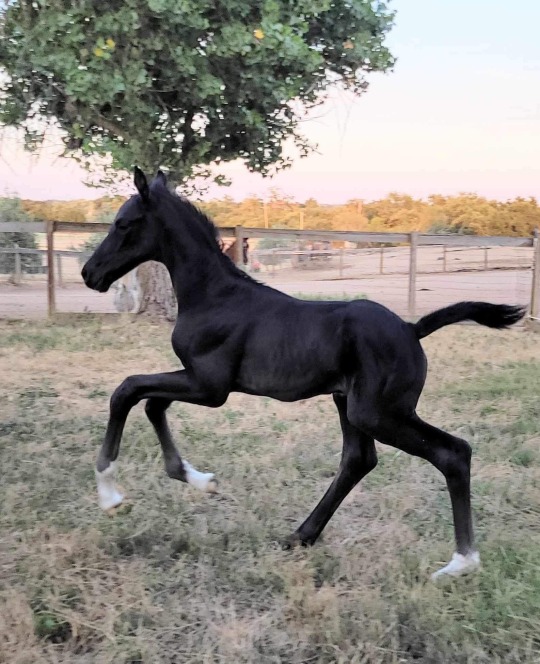

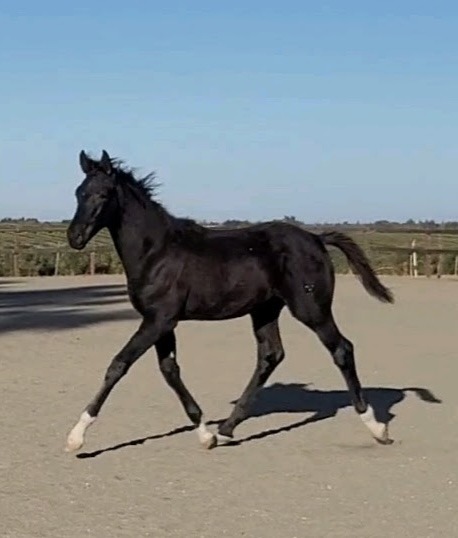

#Witch#witchcraft#pagan#divination#tarot#green witch#hedge witch#eclectic witch#runes#elder futhark#baby witch#new witch#beginner witch#hearth witch#crystal witch#crystals
45 notes
·
View notes
Text

To anyone in California who needs help getting their horses to safety, I saw this on Facebook. A one Jacob Deutsch is able to help with transportation.
This is the link to his Facebook page, for legitimacy's sake:
Please help spread this around for our California friends!
16 notes
·
View notes
Text
read this if you wanna know about the meyers girlies lmao
since i'm taking a break after midterms beat the shit outta me a la "Lets Go To The Mangaka's House" i'm just gonna brainrot about my ocs here until I can get moving again
so if y'all got questions about them lemme give you a rundown
Christine Meyers - Part 3
Stand: Apep, representative of the Egyptian Deity of chaos, he is a Lil yellow and blue snake. Grows with a challenged opponent's anger, but can feed off of Christine's anger as well
Originally a recently graduated Archaeology intern that was targeted by Dio, ended up accompanying the SDC to Cairo
Catalogued all of the stands in Egypt at age 23, and continued to catalog them for teh Speedwagon Foundation until her retirement in 2004 at age 39
Jade Sato-Stephens - Part 4
Stand: Clint Eastwood. A little Jeep that, when Jade knows a person through a name and photo / meeting them, can be used to track them within a 2km radius. If more than 2km, Clint will go in their direction. Can also possess and control vehicles
Moved to Morioh with her mother after her parents divorced, and ended up living next to Yoshikage Kira, and then helped Rohan Kishibe track him down after receiving her stand
Ended up dating Rohan Kishibe and finishing college in Japan, and accepted a job from the Speedwagon Foundation afterwards
20 during the events of DiU, Inherited the stand diary from her Aunt Christine in 2004 at 25
Melanie Meyers - Part 6
Stand: Click Click Boom. A pink iPod and set of wired headphones that can manipulate and hijack radio frequencies.
She's a Californian crime boss, running several syndicates across the United States, and having ties to global crime networks such as Passione *wink wink*
Sentenced to 45 years in prison for Tax Fraud, Mass Weapons Transport Across a Secure Border, Forgery, and Grand Theft Auto at age 18, 21 during the events of Stone Ocean.
Resides in the cell next to Jolyne Cujoh and Gwess, and is one of the most influential people at Green Dolphin Street Prison. Melanie catalogues and relays stand encounters within GDST to her niece, Jade Sato-Stephens
Isadora Meyers - Part 7
Stand: Hotel California. Red cicadas that can mimick Isadora's voice, allowing her to throw it to various locations. When bullets are shot at it, it ricochets the bullet toward the most immediate threat
Isadora is the 20 year old heir to the Meyers Mapmaking Company after her brother died of Yellow Fever
She took her brother's place in the race on his horse, Rio, in order to fulfill a contractual stipulation for the Meyers sponsorship of the SBR, ended up a race frontrunner very early on due to her trail-riding background
She is a decorated marksman under her brother's name, with several national shooting championships. She is armed with a rifle, and by the end of the race, two pistols.
THESE ARE MY BABIES BE NICE TO THEM PLS
and you can read more about them on ao3 :) OR you can send asks about them lol
#jjba fanfic#jjba oc#jojo no kimyou na bouken#jojos bizarre adventure#jojo no kimyō na bōken#jojo's bizarre adventure#jjba part 3#jjba part 4#jjba part 6#jjba part 7
7 notes
·
View notes
Text

US postage stamp, 1988 “3¢ Conestoga Wagon” Scott #2252
Issued: February 29, 1988 - Conestoga, Pennsylvania Quantity: 129,828,000 Designer: Richard Schlect Printed By: Bureau of Engraving and Printing (engraved)
The Conestoga wagon was created by German settlers in Lancaster County, Pennsylvania in the early 1700s. It was named after the Conestoga River and Conestoga Township. These covered wagons could carry up to six tons and were pulled by horses, mules, or oxen. The Conestoga wagon was designed so that the items inside wouldn’t move around and also to help it cross rivers and streams. The most common use was to transport produce to fairs and farmer’s markets. Its rounded, boat-like-shaped bed, high side walls, and wide-rimmed, oversized wheels later made it ideal for traveling through the Appalachian Mountains. Contrary to popular belief, these wagons were never used by settlers traveling from Oregon to California.
#stamp#mail#stamps#stamp collecting#postage#stamp collection#usps#postage stamps#philately#philatelic#wagon#conestoga wagon
5 notes
·
View notes
Text
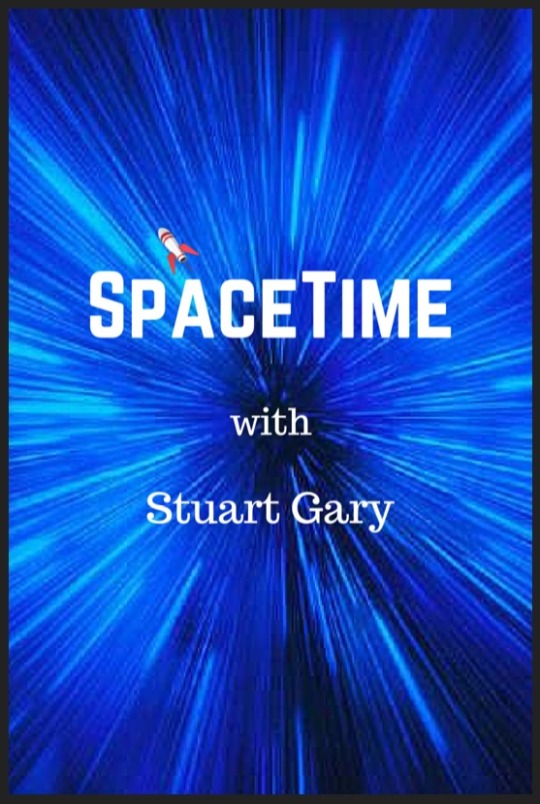
New SpaceTime out Monday
SpaceTime 20240826 Series 27 Episode 103
Starliner crew to return on Dragon
NASA has decided to return the stranded Starliner crew to Earth aboard rival SpaceX’ Dragon capsule because of ongoing concerns about the reliability of their Boeing spacecraft.
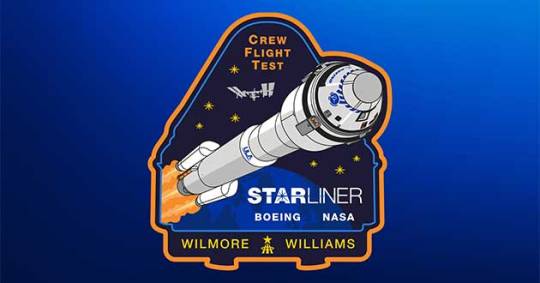
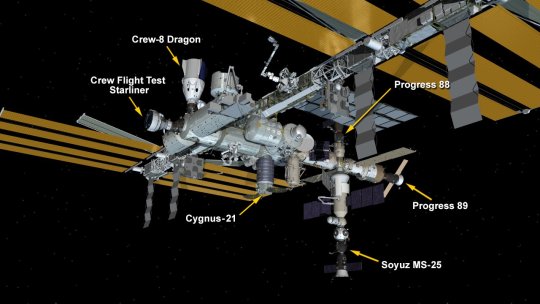
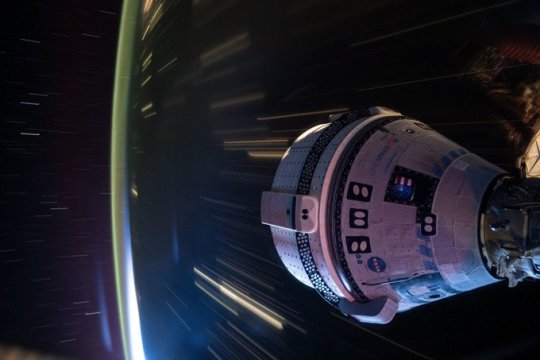
Tracking down the asteroid that killed the dinosaurs
A new study claims the asteroid which triggered the extinction of 75 percent of all life on Earth including all the non-avian dinosaurs 66 million years ago originated beyond the orbit of Jupiter during the early development of the solar system.



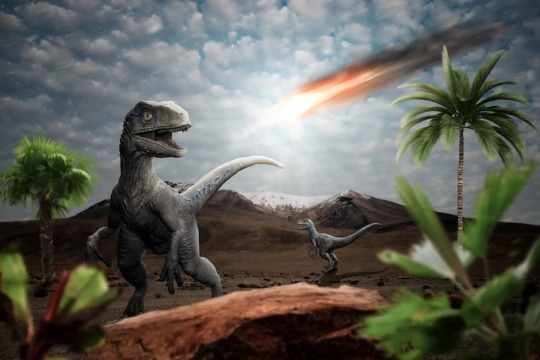
JUICE completes the first joint Lunar-Earth gravity assist flyby
The European Space Agency’s JUICE -- Jupiter Icy Moons Explorer – spacecraft has successfully completed the first ever joint Lunar-Earth gravity assist fly by flinging itself just as planned towards Venus.
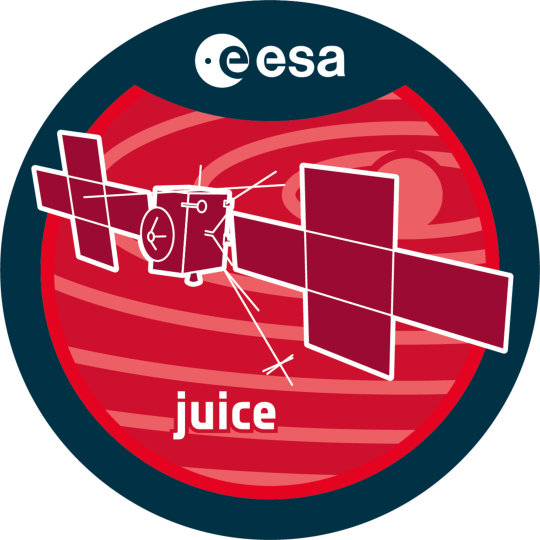
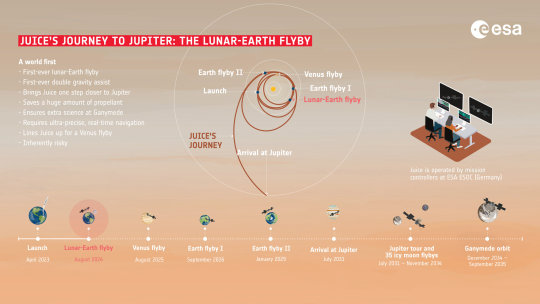
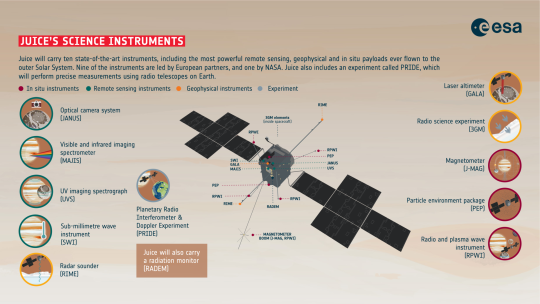
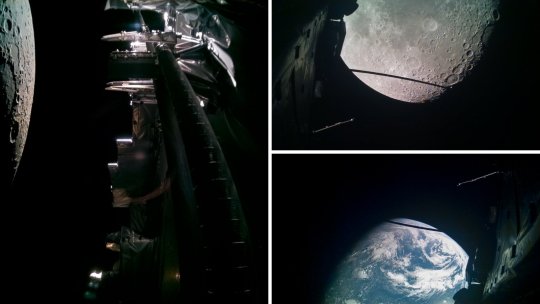
Three more Australian satellites sent into orbit
The latest trio flew up aboard SpaceX’s transporter 11 mission on a Falcon 9 rocket from Space Launch Complex 4E at Vandenberg Space Force Base in California. Transporter 11 is carrying 116 payloads, including CubeSats, microsats, and an orbital transfer vehicle carrying eight payloads.


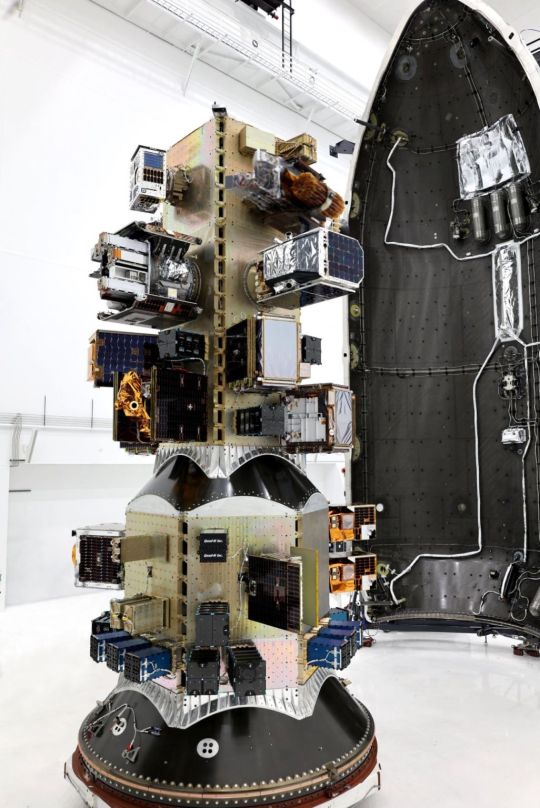





The Science Report
Babies born to fathers of an older age more likely to have health complications at birth.
The bacteria that can produce rigid, heat stable plastics.
Tiny volcanic glass shards found in Tasmania came from a super-eruption in New Zealand.
Skeptics guide to body language
SpaceTime covers the latest news in astronomy & space sciences.
The show is available every Monday, Wednesday and Friday through Apple Podcasts (itunes), Stitcher, Google Podcast, Pocketcasts, SoundCloud, Bitez.com, YouTube, your favourite podcast download provider, and from www.spacetimewithstuartgary.com
SpaceTime is also broadcast through the National Science Foundation on Science Zone Radio and on both i-heart Radio and Tune-In Radio.
SpaceTime daily news blog: http://spacetimewithstuartgary.tumblr.com/
SpaceTime facebook: www.facebook.com/spacetimewithstuartgary
SpaceTime Instagram @spacetimewithstuartgary
SpaceTime twitter feed @stuartgary
SpaceTime YouTube: @SpaceTimewithStuartGary
SpaceTime -- A brief history
SpaceTime is Australia’s most popular and respected astronomy and space science news program – averaging over two million downloads every year. We’re also number five in the United States. The show reports on the latest stories and discoveries making news in astronomy, space flight, and science. SpaceTime features weekly interviews with leading Australian scientists about their research. The show began life in 1995 as ‘StarStuff’ on the Australian Broadcasting Corporation’s (ABC) NewsRadio network. Award winning investigative reporter Stuart Gary created the program during more than fifteen years as NewsRadio’s evening anchor and Science Editor. Gary’s always loved science. He studied astronomy at university and was invited to undertake a PHD in astrophysics, but instead focused on his career in journalism and radio broadcasting. Gary’s radio career stretches back some 34 years including 26 at the ABC. He worked as an announcer and music DJ in commercial radio, before becoming a journalist and eventually joining ABC News and Current Affairs. He was part of the team that set up ABC NewsRadio and became one of its first on air presenters. When asked to put his science background to use, Gary developed StarStuff which he wrote, produced and hosted, consistently achieving 9 per cent of the national Australian radio audience based on the ABC’s Nielsen ratings survey figures for the five major Australian metro markets: Sydney, Melbourne, Brisbane, Adelaide, and Perth. The StarStuff podcast was published on line by ABC Science -- achieving over 1.3 million downloads annually. However, after some 20 years, the show finally wrapped up in December 2015 following ABC funding cuts, and a redirection of available finances to increase sports and horse racing coverage. Rather than continue with the ABC, Gary resigned so that he could keep the show going independently. StarStuff was rebranded as “SpaceTime”, with the first episode being broadcast in February 2016. Over the years, SpaceTime has grown, more than doubling its former ABC audience numbers and expanding to include new segments such as the Science Report -- which provides a wrap of general science news, weekly skeptical science features, special reports looking at the latest computer and technology news, and Skywatch – which provides a monthly guide to the night skies. The show is published three times weekly (every Monday, Wednesday and Friday) and available from the United States National Science Foundation on Science Zone Radio, and through both i-heart Radio and Tune-In Radio.
#science#space#astronomy#physics#news#nasa#astrophysics#esa#spacetimewithstuartgary#starstuff#spacetime#jwst#hubble space telescope#james webb space telescope
9 notes
·
View notes
Note
What if the outsiders was a musical
"Mamma mia!" Johnny exclaimed as he jumped 300 feet in the air.
"Here we go again," Dallas "Tulsa" Winston sang as he danced around Johnny.
Johnny gave him a weird ass look. "Wtf u talking bout?" He said as he raised an eyebrow. "I dropped my pizza!"
"Then why'd you say 'Mamma Mia'?" Hamilpony neighed.
"BECAUSE IM FRENCH?" The cripple yelled. "It's an expression commonly said in Germany," He explained.
Mr clean opened his mouth to speak but Shirley Temple 7-UP interrupted him.
"Who is that DIVA?!?!" Cactus cooler pointed to the elevator door of the DX Rodgers Drive in.
"WHY SO DEVIOU-" two bit said before screaming (AHHH!!!! AHH IM SO SCARED AH AH ANXIETY IS HERE) as he slipped on the fallen pizza. They heard a sickening Crack before two-bit (with a hyphen) went limp, his eyes still open. His once lively eyes always swirling with mischief and funny haha now empty and unseeing.
"He had it coming, he had it coming" Steve shrugged as he polished his axe after coming back from the Mines. "I betcha you would've done the same."
"Omg," the horse purred in disbelief. "Is he doing number 17 THE SPREAD EAGLE?"
"hold on.." Mr beefy Said slowly with caution. "Did you just say..eagle?"
Pony horse neighed and bucked his hind legs in confirmation.
"IM PROUD TO BE AN AMERICAN!!" Mr a5 wagyu belted out as he rode a broom around the big screen.
"Haha!" Ponyhorse lampooned and guffawed. "That was a buckled and chuckle; Certainly the bees knees!" He gave a crooked smile. His yellow horse carrot and hay munching teeth flew away.
Dr pepper held his head in his hands, sighing in disappointment. "I've given you sunshine, I've given you rain." His gaze drifted to the concession stand, "and all you given me, is heartache and pain." He started to sob hysterically." He started to levitate with the trees.
"And he," Johnny screamed, steam blowing out of his ears and boat horn noises exited through his noses (all 3 of them), "was a fairy.."
They all agreed that it was really unfair and they got In a fight. I guess the power of friendship was faulty, because their friendship is what broke them.
Johnny went to fight Karate in California, Dallas "Tulsa" Winston got recruited at a shein factory, Steve met new people in the Mines and got transported to a world full of blocks, ponyboy was the first horse to win the revolution, Zero sugar Less ice Large Thai tea went to war and lost his left big toe and got into foot modeling, Darry became an influencer never seen without his Stanley and ugg boots, and two bit never did get his knee surgery that was scheduled for the next day. Those who know ☠️☠️☠️
Johnny never did get his pizza.
Js a thought 😁🎀
… that feeling when kneeling surgery is tomorrow ig 😕
4 notes
·
View notes
Text
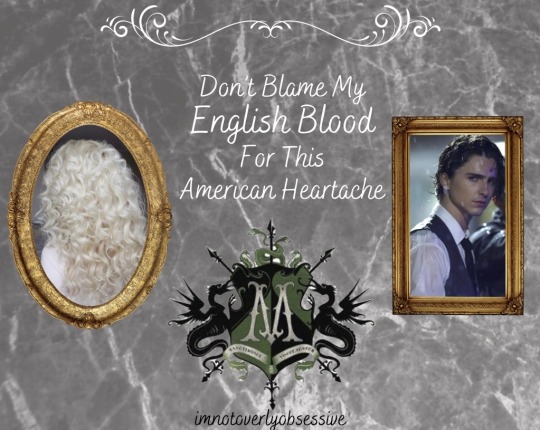
Don’t Blame My English Blood On This American Heartache
Chapter One: I Want To Break Free
AO3 info prologue one two three four five six seven eight nine ten eleven twelve
All my work is 18+.
Try to color inside their lines; try to live a life by design. I just wanna be myself. I can’t be someone else.- ONE OK ROCK, Stand Out Fit In
July, 1984
Santa Cruz Mountains, Northern California
Sera’s blue animal—an owl—flew around the clearing, and she laughed with amusement. She’d been able to produce one for years now, but successfully performing a spell, especially a complex one, was always gratifying.
Taana’s horse chased the owl, and the two girls laughed, leaning back against the trunk of an ancient redwood.
“Have you tried talking to your parents about it again?”
Sera fixed her friend with a side-eyed look. “Of course not. My mom damn near had a heart attack when I wanted to go as a witch for Halloween last year, and I was mostly joking. Y’know, ‘woo, I’m about to be eighteen, it’s witch year!’ kinda thing.” Sera sighed, leaning her head back against the tree trunk, ignoring the way her curls snagged on the bark. “Any mention of witches or magic, she freaks.”
“What about your dad?”
“Same thing.” Sera sighed again, glancing up at the setting sun. “They’ll expect me home for dinner soon. I’d better go.”
“You good to relocate back?”
Sera nodded, standing up and brushing herself off.
With a wave of her hand, her owl dissipated like smoke on the breeze.
“See ya later, Ta,” she said with a smile over her shoulder.
“Later,” her friend returned.
Then, Sera shut her eyes, picturing the space beneath her house, which was raised off the ground via a deck. Then, with a crack!, she found herself exactly where she’d pictured herself.
She’d vomited the first time she’d relocated, but by now, she was used to the sensation of the displacement of her body as she was transported somewhere else.
She crunched through the bush and out from under the house, making her way up to the deck.
A soft hooting sounded from a tree above her, and when Sera glanced up at the owl, she was surprised to see that it was one she’d never encountered before. Sera had been all around the Bay Area, particularly the Santa Cruz mountains, but she’d never seen such an owl before. It was probably of average size for such a bird, perhaps a bit over a foot in height with speckled brown feathers and jarring pitch black eyes.
The most startling thing about the owl, however, was the fact that in its beak, it was holding what appeared to be a piece of paper.
Sera blinked at it in astonishment as it descended from the branch and landed on the railing she was standing next to. Upon closer inspection, it turned out the paper wasn’t only a paper, it was a letter.
The owl looked at her—although it was difficult to tell if it was looking at her or merely facing her, as its eyes were entirely black—and hopped closer, lifting its head and sticking the letter towards her.
“You… you want me to take this?” Sera asked dubiously. Predictably, the owl didn’t respond, instead choosing to thrust the letter towards her again.
Sera took it with no small amount of hesitation. The owl hooted softly at her, and she wasn’t entirely sure why, but she got the distinct impression that it was trying to be encouraging. She looked down at the letter and examined the wax seal. She’d never seen a wax-sealed letter before, let alone one so ostentatious.
In the wax, there was an ornate family crest, it looked like: two dragons flanking a shield with a very fancy-looking letter M. She turned the letter over, seeing her full name written there, complete with her address. In the top left corner, however, it read:
Ursa Malfoy Abbott
Malfoy Manor
Wiltshire, England
Malfoy Abbott? England? She knew her parents hailed from England, having moved to the US before her birth, but they’d always told her they had no family, no relatives. Yet this woman had the same name as her, just with “Abbott” on the end.
Turning the letter back over with shaking hands, she broke the wax seal and removed the letter.
It was written on a thick, old-fashioned piece of paper that reminded Sera of the pictures she’d seen of the Constitution. The letter read:
Miss Seraphine Marianne Malfoy,
I hope this letter finds you well. Hecate—the owl—is old, but she’s reliable.
Allow me to begin by introducing myself. My name is Ursa. I am the eldest child of Draco Malfoy, your great-great-great grandfather. He died in 1976 during an outbreak of Dragon Pox that wiped out much of the Malfoys, it was the result of a foolish attempt at dragon taming that my father thought was a good idea, wanting to celebrate his one hundred and twenty-second birthday with some excitement.
As you may not be aware, our heirdom is patrilineal. That is to say, they fall to all male descendants before female ones. As such, after the death of Abraxas, his son, Lucius, was the only male Heir remaining. However, he foolishly supported the Dark Lord, and was imprisoned when the Dark Lord fell four years ago. His imprisonment left me the acting Head of Household until he died a fortnight ago. It was only then that I gained access to the offices of the Head of Household, which contained the unedited family tree.
As I understand it, Seraphine, your parents, Septimus Malfoy II and Marianne Prewett, are Squibs. Which is to say, they cannot perform magic. The Malfoys are a traditional lot, and my father was no exception. He would’ve been ashamed that someone of his line was born without magic, and so he must have struck Septimus from the tree, ignoring the names that formed upon his descendant getting married and having a child.
My opinion of Squibs is rather neutral, and I don’t think less of you for being born to parents who lack magical abilities. But my reason for this letter is because I am very old, and I cannot remain the Malfoy Head of Household forever. I need an Heir, and there is no one left. There are the wives of some of your male relatives who survived the outbreak, but you and I are the only Malfoys by birth that remain.
I am writing to you, Seraphine, to ask you to come to England and learn to be my Heir. Upon inquiring at llvermorny, it seems your parents responded to your acceptance letter on your behalf, declining in favor of a Muggle upbringing. I understand that you are eighteen, but the Hogwarts headmaster is willing to make an exception due to the unusual circumstances and allow you to enroll as a seventh year student. If you have not developed your magic sufficiently for enrollment in Hogwarts as a seventh year, I am capable of any needed instruction.
The Heir to the Malfoy name would, upon ascension to the title, be entitled to all land, property, and holdings to the name, as well as the contents of the primary Malfoy Gringotts vault in addition to the one that was automatically added upon your birth.
If you choose to take this role upon yourself, please send the letter with Hecate. You may speak to her if needed; she will understand. If you consent to it, I shall respond with a portkey that will bring you here to Malfoy Manor. I advise that you bring anything you wish to have with you, as your new life will be here in England. We can, of course, arrange for your parents to come, as well.
Yours,
Ursa Malfoy Abbott
Sera couldn’t believe the letter. She couldn’t believe it. Mind still reeling, she recognized that if she didn’t want her mother’s interference, she had to respond, and fast.
She turned to the owl.
“Y— You can understand me?” she asked it rather hesitantly.
It hooted quietly at her, and Sera hoped that that meant yes.
“Please fly back up to the tree you were in before,” Sera told it, “and try not to make too much noise or draw attention to yourself. I’m going to go in the house and write a response before my parents notice I’m home. When I come back outside, I’ll give you the letter.”
The owl hooted once before swooping up into the tree without hesitation.
Unsure if her mother was home or not, Sera went around to the side of the house and climbed through her bedroom window. She grabbed some stationary from her desk, wrote a quick response saying that she’d been taught magic in secret, was fairly advanced at it, and to please come in person or work out a way for them to communicate verbally or something. There was a lot of information in that letter, and she wanted to speak to this woman over the phone at the very least.
A couple of weeks later, the owl returned with a small pouch of black powder and instructions to put her head into an unlit fireplace when she knew for certain she wouldn’t be disturbed, and to say the words, “Malfoy Manor.”
Naturally, she couldn’t very well do this at home, so she went straight to Ta’s, explained the situation, and was promptly led to their fireplace.
Sera knelt down, her knees on the cold wood floors, and stuck her head inside. She coughed momentarily before waving a hand to clear up any residual particles in the air. Then, she dropped the black powder in the grate and said, “Uh… Malfoy Manor.”
Suddenly, there were green flames surrounding her field of vision, and then… and then she was looking out from what seemed to be the fireplace in a very nice bedroom that was furnished in gold and white.
“H— hello?” Sera called out, confused.
After a moment without a response, she was about to call out again when an elderly woman walked through a set of double doors across the room.
The woman approached her slowly, looking hesitant and maybe even a bit nervous, before sitting down in a chair in front of the fireplace Sera was looking through.
“Hello,” Sera greeted awkwardly.
“You are Seraphine, I assume?” the woman asked, examining Sera’s features with keen eyes.
“Ye— Yes. I prefer to be called Sera, actually, but yeah.”
“I am Ursa Malfoy Abbott, your aunt.”
Sera stared at her. “Nice… nice to meet you.”
The woman nodded, a small smile on her face. “You look like a Malfoy, you know.”
Sera’s eyes widened. “I do?”
Her aunt—Ursa—nodded again. “Indeed. It’s your hair, you know. Oh, it’s wilder than ours tends to be. I expect that’s the Prewett in you, honestly. But the color, that white-blonde? A family trait.”
Sera smiled a little at that, pleased at the idea that some of the heritage she’d apparently been kept from was visible.
“Is it true?” she asked after a moment. “Everything you said in your letter?”
Ursa looked at her for a long moment, clasping wrinkled hands in her lap. “Yes. You and I are the only ones that remain of the Malfoy bloodline. I can’t very well have children, of course, and someone needs to take over in my stead someday.”
Sera hesitated. “I don’t know if I’m ever going to have any kids,” she admitted.
Ursa waved her hand dismissively. “We can find someone to have them for you if you so choose. The important thing is we continue the bloodline through you. As long as you consent to children being born to you, even if not from you, that’s perfectly fine.”
“What, like surrogacy?”
Ursa thought for a moment, looking a bit confused. “Another witch would carry your child, essentially. It’s done on occasion.”
Sera nodded slowly. “I’d have to think about that. But… you wanted me to be your Heir, didn’t you?”
Ursa nodded. “Indeed. It was supposed to go to Lucius, my nephew through my brother, Scorpius, but Lucius was foolish. Allied himself with a madman who would obviously fail.” She sighed. “So it falls to you, my young niece.”
Sera stared at her. “And… and I’m not descended from Scorpius?”
Her aunt shook her head. “No. Your great-great grandfather was my youngest brother, Cepheus. Both he and his wife are dead, as is their son, Serpens.”
Sera frowned. “Oh.” Just how old was this woman? She didn’t look like she was old enough to have outlived Sera’s great-great grandfather.
“In any case,” her aunt went on, “if you choose to accept, I will ensure you are able to take a placement test for Hogwarts. I’ll speak to Albus about it.”
She blinked. “Albus?”
“The Hogwarts Headmaster. We went to school together, you know. I was a few years ahead of him, of course.”
“I… see.” She swallowed, looking around the fancy room her aunt was in and trying to imagine herself inside it. “You’re sure it’s me?”
Aunt Ursa pursed her lips. “Yes, quite sure. The family tree is in my study.”
If this woman was telling the truth, if she really was Sera’s aunt, she owed it to herself to go and explore her identity, didn’t she?
“Okay,” Sera finally said. “Go ahead and send the portkey.”
“Very well,” her aunt said with a nod. “Shall I expect your parents as well?”
She tensed at the thought of her parents and their lies. “No,” she decided. “No, I don’t think you should.”

Sera returned home in a sort of daze; her parents had lied to her. They had lied to her entire life, it would seem. Now that the anxiety of speaking to her aunt had passed, fury scorched through her veins.
Sera strode over to the front door of the house, and it slammed open without her so much as touching it. Her magic was crackling in her hair and tingling in her fingertips the way it did when she was too angry to control it.
She heard her mother working in the kitchen, presumably on their dinner. “Mom,” she called out, her voice shaking in her rage.
“In here, darling,” Marianne returned.
To her surprise, her father was already at the kitchen table. He must’ve gotten home from work unusually early. This was just as well— she needed to speak to them both, and she’d rather not repeat herself if she could avoid it.
“You lied to me,” she said without further greeting. “You have been lying to me my entire life.”
“What?” her mother asked in shock and confusion. Her father’s brows furrowed, and then his gaze fixed on the letter clutched in Sera’s hand.
“Mari,” her father addressed her mother in a very nervous-sounding voice, “look.”
Her mother’s eyes found the letter, too, and then flitted back up to her daughter’s face, the way her eyes were burning with hurt and betrayal, the way her wild curls were crackling with magic.
“You knew I was a witch,” Sera practically growled. “You knew I’d been invited to attend a magic school, and you didn’t even tell me. I was forced to learn magic in secret, to hide it from you.”
The kitchen lights were flickering, the cookware shaking.
“We… we only wanted to protect you,” Marianne said shakily, taking a step towards her daughter.
“From what?” Sera hissed furiously. “From my identity? From my heritage? You don’t have any magic, so you didn’t want me to have any, either?”
“That world,” her father began, standing up to join his wife in an attempt to placate their daughter, “it’s dangerous, Sera. You’re safer here. With us.”
“You can’t protect me from anything,” she snapped. “I can protect myself a hell of a lot better than the two of you combined.”
Both her parents’ faces were ashen, and her mother was near tears.
“I’m the last living Malfoy with magic, other than an old woman. Did you know that? It’s just me. You kept me from my life.”
“Sera,” her mother began tearfully, “we just wanted what was best for you—“
“Apparently, you have no idea what’s best for me!” she shouted, her rage spiking. This seemed to be too much for the kitchen lightbulbs, because they shattered in a burst of sparks and glass. “You deceived me, you separated me from the only family I’ve got that’s like me, you denied me an education—“
“We did what we thought was best!” her father shouted, his own temper flaring up. “We hoped you didn’t have any magic, and we held out hope for it until you got that ridiculous owl post, and when you did, we tried to stop you from partaking, because we thought it was best for you!”
“Well,” Sera hissed, her eyes narrowed, “if you ever decide you can love me despite my magic, write to me in Wiltshire.” She glared fiercely at her father. “I expect you know how, Dad, as the great-great grandson of the former patriarch.” She turned to walk away, then said over her shoulder, “In case you’re interested, Dad, your parents are both dead. So’s your great grandfather and great-great grandfather.”
“W— what?” her father sputtered, having the audacity to sound upset about it. “When?”
“‘76,” Sera told him. “I’m packing and going to stay at Ta’s until our aunt sends me a portkey.”
“We won’t let you!” her mother exclaimed.
Sera rounded back on them. “And what the hell do you think you can do to stop me, huh? You can’t keep me inside. You can’t force me to do anything.” She glared viciously at them. “There is no cage you can craft that could keep me in.”
With that, she stormed off, slamming her bedroom door with a flick of her wrist.
She shrunk her belongings and shoved them into a fairly small (but magically extended) bag. Her parents pounded on her door, but they couldn’t get inside. The charm she’d used to lock them out would’ve been difficult to break even with magic.
Once she was packed and her bedroom was sparse, she relocated in front of Ta’s house with a sharp crack!

Two weeks later, Hecate the owl returned. It seemed she’d had no trouble finding Sera in the tiny mountain village Ta lived in.
In the envelope was a coin, which the letter said was the portkey. Sera said her goodbyes to her friend, promising to call, and took the portkey in hand.
She was off to England.

Beta’d by the wonderful @lilmaymayy 💗
Tag list:
@ellamaianderson @shika1200 @blackqueenstarseed1 @gatoenlaciudad @esmaada @mariaelizabeth21-blog1 @softhecreator @timolaurence @timmymyluv @oddlyenoughiamweird @leecrunchybones @s-we-e-t-t-ea @almostg @leespparker @bubblebuttwade @glizzymcguirex @starberry-cake @camille-1019 @lixzey
To be added, please ask 💗
#my writing#fanfic#fanfiction#harry potter fanfiction#mauraders#mauraders era#Regulus black#regulus arcturus black#regulus deserved better#regulus x oc#regulus x reader#regulus x y/n#regulus x you#regulus black x you#regulus black x y/n#regulus black x female reader#regulus black x reader#Regulus black x oc#Regulus black x original character#Regulus black x original female character#Regulus x original female character#Regulus x original character#Regulus black smut#Regulus smut#regulus imagine#regulus black imagine#original female character#original character#OC#fem!oc
18 notes
·
View notes
Text
Special Delivery! Here Are 17 Curious Facts About The Cincinnati Post Office
On The Barrelhead The Cincinnati Post Office was established in 1794 and received soon after its first mail delivery, consisting of sixteen letters, two newspapers and a snuff box. All mail then was “collect on delivery” or COD – recipients paid the postage. Postage for a simple letter was 25 cents. The postmaster displayed all mail on top of a barrel at his house. Anyone wanting to collect mail paid the postmaster.
Returned To Sender Cincinnati’s first postmaster was an attorney and Revolutionary War veteran named Abner Dunn, who ran the local post office out of his house at the corner of Second and Butler streets. Postmaster Dunn died in 1795 after only a year in office and was buried in the backyard of his house, which was also the backyard of the post office. The site is now a parking lot near Sawyer Point Park.
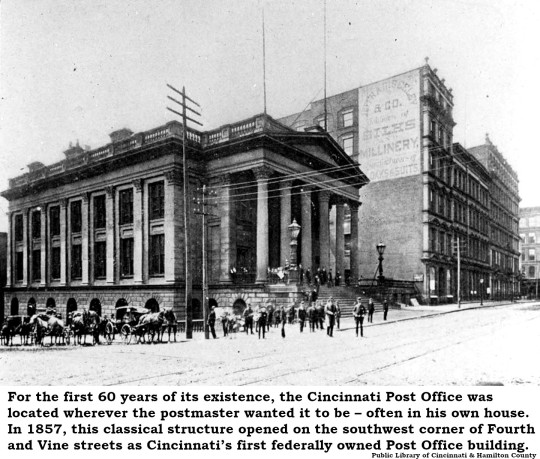
Everybody Knew Your Business From 1799 up until Cincinnati adopted free home delivery in the late 1860s, the Post Office regularly published a list of all letters awaiting collection, so everybody in town knew when you had mail. If you ignored the published list for three months, your mail was sent to the dead letter office. The lists were extensive, occupying, in small type, as much as half a page in the Cincinnati Commercial or Gazette.
Keep It Under Your Hat Cincinnati’s fifth postmaster was an eccentric Methodist minister named William Burke, who served a very long term from 1814 to 1841. Possessed of a deep, guttural voice attributed to his lifelong addiction to chewing tobacco, Burke is remembered for personally delivering mail around town while making social calls. He kept the items to be delivered in his hat. It is said that “Father Burke,” as he was known, also delivered wise counsel to his patrons along with the mail.
Penny For Your Thoughts During the 1840s, Cincinnati experimented with home delivery, but charged for the service. Two “penny postmen” divided the downtown area, with Joseph Haskell taking the route north of Fourth Street, and Hiram Frazer delivering south of Fourth. Recipients, in addition to the standard postage, coughed up a penny for each letter delivered to their front door.
Inaugural Air Mail? The first mail at least partially delivered by air left Cincinnati on Independence Day 1835. Obviously, no airplane was involved. The pilot was the “Prince of Aeronauts,” Richard Clayton, and the vehicle was his renowned balloon, the Star of the West. Clayton ascended from an amphitheater constructed in the middle of Court Street between Race and Elm with, among other cargo, a satchel of mail intended for eastern cities. He crashed 100 miles away in Pike County and had the post office in Waverly, Ohio, send the letters the rest of the way. A trial involving an airplane in 1912 was really a gimmick in which mailbags picked up at Coney Island were dropped at the California Post Office, just 8,000 feet away.
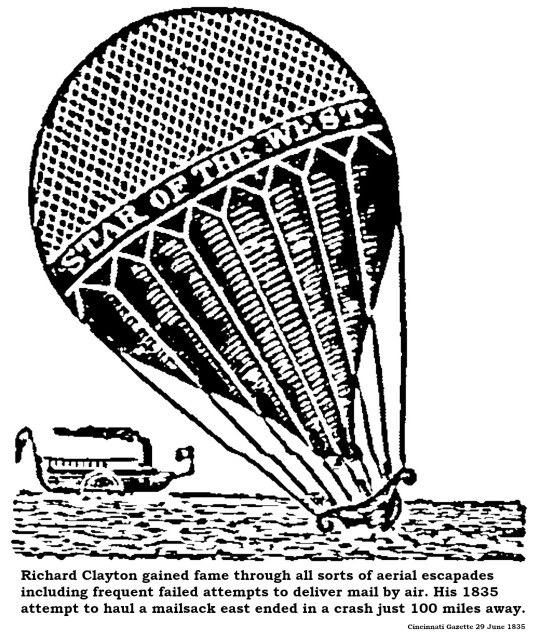
What The Dickens? By 1825, stagecoaches had replaced pack horses as the primary vehicle for transporting mail throughout the Ohio Valley and nascent Midwest. In addition to letters and newspapers, mail coaches carried passengers and were often the most reliable means of travel available outside the East Coast. When Charles Dickens visited Cincinnati in 1842, he arrived by mail coach.
Postmaster Is The ‘Last Man’ On 6 October 1855, Cincinnati Postmaster John L. Vattier sat down to a most unusual dinner. His table was set for seven, but every place setting, excepting one, was empty. Vattier was the last of seven young Cincinnatian men who survived the 1832 cholera epidemic, bought a pricey bottle of wine, and pledged to meet each year for dinner, saving the bottle for the last of them to survive. On that evening, following the funeral of his last colleague, Vattier dined alone and drank the bottle in memory of his friends.
Postal Currency – What A Riot! As the United States struggled to finance the Civil War, an unintended consequence was a shortage of coins. The Post Office stepped up to alleviate the shortage by issuing postal currency in the form of “shinplaster” paper bills in fractions of a dollar. Public demand was so great in Cincinnati that a riot broke out at the distribution center on 5 November 1862. Although no one was seriously injured, federal troops called in to disburse the 2,000 rioters drew swords and attached bayonets to their rifles until calm was restored.
Shillito Becomes A Worthy Investment Cincinnati merchants, notably John Shillito of department store fame, devised creative ways to issue change when coins were scarce. During the coin-scarce Civil War, Shillito noted that his customers often used postage stamps as currency. Shillito crafted special circular cases to contain one-cent, three-cent or five-cent stamps and used them just like coins in providing change to customers. Today, an 1862 Shillito “encased postage” coin can bring as much as $1,250 at auction.
Hier wird Deutsch gesprochen You didn’t have to be German to manage the Cincinnati Post Office, but it didn’t hurt. Between the Civil War and the Twentieth Century, Cincinnati had 10 postmasters and fully half of them were born in Germany. Our Teutonic mail mavens were John C. Baum (1861 to 1864), Frederic John Mayer (1864 to 1866), Gustav Robert Wahle (1874 to 1878), John P. Loge (1878 to 1882) and John Zumstein (1891 to 1895).
Wayward Mail According to the Post [9 July 1891], Cincinnatians were lucky to receive any letters at all because of their incompetence at addressing envelopes. The Cincinnati Post Office reported that year 156,275 incorrectly addressed letters, 15,620 insufficiently addressed letters, 2,632 illegibly addressed letters, and 10,923 incorrectly stamped letters. In all, 279,385 pieces of wayward mail were returned to sender by exasperated Cincinnati postal clerks. The staff specifically assigned to decipher bad addresses were called “Nixie” clerks.
Babies By Mail The United States Post Office introduced parcel-post deliveries in 1913 and boasted that anything – anything at all – under 11 pounds was suitable for shipment. Taking the Post Office at its word, a Clermont County farming couple, Jesse and Matilda Beagle, made history on 25 January 1913 when they packed up their infant son, and shipped him off via parcel post to his grandparent’s house. The Associated Press claimed the Beagles were the first customers to utilize the new parcel post system in this manner.
Potatoes, Too! A Kentucky farmer did the math and determined that parcel post rates were cheaper than hiring a dray to get his potato crop to market. On 28 October 1916, the Cincinnati Post Office found 35 sacks of spuds, weighing 50 pounds each, waiting to be processed and delivered to a Court Street wholesaler. All 1,750 pounds of taters arrived at their appointed destination by mid-afternoon.
Photographic Memory Postal employees were legendary for their ability to accurately deliver mail bearing a minimal address. That skill was tested to an extreme in 1929 when an envelope arrived in Cincinnati bearing only a photograph of a building and the name of the city. A postal clerk recognized the building in the photograph. Sure enough, the letter was intended for Oliver F. Slimp, manager of the Edwards Building at 528 Walnut Street, the building pictured in the photograph pasted on the envelope.
The Porn Stops Here Federal investigators tracing the distribution of obscene materials throughout the Midwest found that most of the pornography was mailed from Cincinnati. On 28 November 1940, postal inspectors struck paydirt in a West Eighth Street warehouse, where they found 28 rolls of motion picture film, 2,000 photographs, 3,000 printed cartoons, a dozen cartons of obscene literature and related printing plates. Two Cincinnati men were arrested as a result of the raid.
End Of The Line Cincinnati’s art-deco styled Main Post Office on Dalton Street was originally constructed in 1933 as the Dalton Annex. The huge building was intentionally located adjacent to railroad lines and the new Union Terminal because so much mail was transported to Cincinnati by train. That advantage disappeared on 17 November 1974 when the iconic track-side facility received the last shipment of mail to arrive in Cincinnati by railroad.
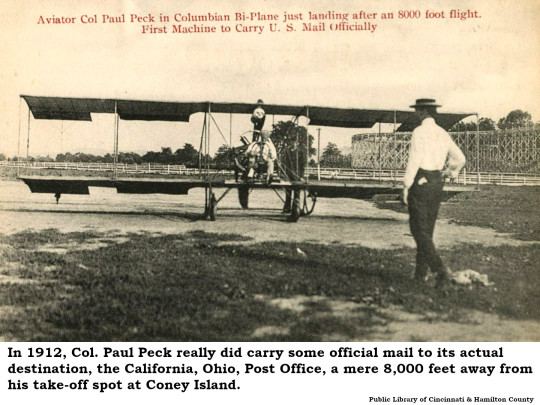
7 notes
·
View notes
Text
Book Trusted Horse Transport Today with Rocking Y Ranch
Need dependable horse transportation now? Call Rocking Y Ranch for stress-free, safe, and prompt horse trucking Companies ! Our experienced team ensures your horse’s comfort and security every mile. Don’t wait—secure your transport spot today and enjoy peace of mind with guaranteed on-time delivery and professional care. Act now for a smooth, worry-free journey! Book An Appointment Now for Stress-Free Horse Journey.
#horse trailering california#local horse transport california#horse hauling companies#horse trucking companies#horse transport california#horse moving california#horse movers california#horse shipping california#Horse transport california#horse transporting california
0 notes
Text
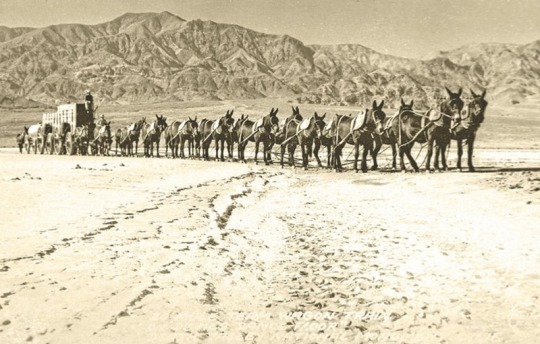
Photo: C. 1883-1889. A 20-mule team before its 165-mile journey to the railhead in Mojave, California. Photo courtesy of the National Park Service The purpose of the twenty-mule-team wagons was to transport 10 short tons of borax ore per journey. The rear wheels, standing at a height of seven feet, were equipped with 1-inch-thick iron tires. The wagon beds, crafted from solid oak, measured 16 feet in length and 6 feet in depth, with an empty weight of 7,800 pounds. The convoy, extending over 180 feet with mules in tow, consisted of three wagons: the first as a trailer, the second known as "the tender" or the "back action," and the last serving as a water tank. When loaded with ore, the complete weight of the mule train, including the wagons, amounted to approximately 73,200 pounds. The water tank, holding 1,200 US gallons, supplied the mules with water during the journey. An additional 500-US-gallon wagon was occasionally appended to deliver water to a dry camp along the route. Over a span of six years, the teams successfully transported more than 20 million pounds of borax out of Death Valley. The horses, positioned as wheelers closest to the wagon, were ridden by one of the two individuals typically required to operate the wagons. While larger than the mules, the horses were considered less intelligent and less adaptable to desert conditions. Remi Nadeau's historical account, "Nadeau's Freighting Teams in the Mojave," highlights the mules' superiority for general use in the desert region. The teamster controlled the team using a single long rein, known as a "jerk line," aided by a lengthy blacksnake whip. Typically riding the left wheeler, the teamster could also operate from the trailer seat, managing the brake on steep descents. The swamper, usually riding the trailer, would be positioned on the back action in hilly terrain to operate the brake. Armed with a can of small rocks, the swamper could encourage an inattentive mule to return to work. Both men were responsible for preparing the team, tending to the mules' needs, and addressing any veterinary or repair requirements. A mid-day stop allowed for feeding and watering the mules in harness, while night stops provided corrals and feed boxes. Each day's travel averaged around 17 miles, and the entire one-way trip took approximately ten days. The company constructed cabins at night stops for the use of drivers and swampers.
6 notes
·
View notes
Text

I hiked Amanda's trail recently and wanted to share the history of the trail. I think it is a good lesson/reminder on why we have reservations for the native peoples in the US and part of the history behind creating the reservations. (Image text below cut)
[Image Text:]
Amanda's Trail of Sorrow
Indians ran away from the Coast Reservation on a regular basis, longing for their home and fleeing starvation and abuse by Indian Agents. The military was called upon to round up these run-away Indians and return them to the reservation. Lieutenant Louis Herzer of Company D, Fourth California Infantry, led a detachment to Coos Bay in the spring of 1864 to retrieve runaways.
Sub-Agent Amos Harvey accompanied the Lieutenant and his men in order to "arrest the Indians" that for a long time had been "infesting the settlement of Coos Bay." Stealth was a required element for successfully catching their "game- squaws, bucks, and half breeds born out of wedlock.'
Corporal Royal Bensell was on that mission. He kept a detailed journal relating the story of Amanda De-Cuys, a blind Coos woman living with a white settler. Excerpts from his journal tell a compelling story.
May 1, 1864
Up Coos River 25 miles to-day after some Indians. Find at the head of tide water a small ranch owned by one De-Cuys. He had a pretty little girl, some 8 years old. We got two Squaws and a Buck. After getting in the boat I was surprised to hear one of the Squaws (old and blind) ask me, "Nika ika nanage nika tenas Julia [Let me see my little Julia]." I complied with this parental demand and was shocked to see this little girl throw her arms about old Amanda De-Cuys neck and cry "clihime Ma Ma [dear mama]." De-Cuys refused to marry Amanda, which would have saved her from internment. He promised Bensell to school Julia.
May 3, 1864
We have taken among the rest several infirm Squaws which the Agent proposes leaving behind to die because he says, "it will cost so far to transportation." Lieutenant Herzer informed the Agent if the Squaws were left he [Herzer] would report him.
[Painting of a Native elder and a younger adult walking with two male soldiers on the coastline towards and soldier on horseback as two other native people, one with a child, lie in the sand.]
May 5, 1864
Lower Umpqua Artist Pam Stoehsler's portrayal of Amanda and other Indians being forcibly marched back to the sub-reservation north of Yachats
[End inserted image]
Break camp and strike directly across the sand hills. One Squaw, (Polly) carries all her "icktus [belongings]" and two children. Harvey furnishes one horse when we need four. This horse packs t[w]o old Squaws. By 4 o'clock the advance reached Winchester Bay and from that time 'till dark they came in by twos & threes, the rear guard bringing in Old Fatty and Amanda.
May 7, 1864
Only made ten miles today. The whole days travel reminded me of a funeral procession, so slow and solemn did we go. First one old "Lama [old woman]" would curl up in the sand, then another, then a general halt, during which the mothers would suckle their children.... Finally out of patience, I would cry "Hyac, clatwa [hurry, go]." It generally took twenty minutes to get started. Some of the Guard, more irritable than me, swore terrifically.
May 10, 1864
This coast along our route today seems volcanic, rough ragged, burnt rock, here and there a light rock which I called pumice-stone. Amanda, who is blind, tore her feet horribly over these ragged rock, leaving blood sufficient to track her by. One of the Boys led her around the dangerous places. I cursed Indian Agents generally, Harvey particularly. By 12 we reached the Agency. The great gate swung open, and I counted the Indians as they filed in, turned them over to the Agent, and, God Knows, we all left relieved.
During the first twelve years of the fifteen years of the Alsea Sub- Agency's existence half of the native population died of starvation, exposure, disease, and abuse. The Alsea Sub- Agency was closed in 1875.
No further information is known about Amanda or if she ever was able to be with her daughter, Julia, again.
[Inserted image of carved Amanda statue, with beads and adornments.]
FOR MORE INFORMATION: www.yachatstrails.org
The first statue at the grotto was washed away in a landslide. The current statue, created at the same time by artist Sy Meadow, was generously donated
[End inserted image]
[End image text]

[Image Text:]
Broken Promises; Forced Internment
The story of Amanda is part of a larger saga of stolen lands, broken promises, inhumane treatment, and forced internment under severe conditions.
In 1855 Central and Southern Oregon Coast tribes signed a treaty ceding their lands in exchange for what they thought would be a peaceful life on a reservation if the treaty was ratified.
In April of 1855, General Joel Palmer, superintendent of Indian affairs for the Oregon Territory, wrote a letter urging the creation of a reservation on the coast of the Oregon Territory to inter Native Americans. In November of 1855 President Franklin Pierce created, by executive order, the Coast Reservation. The new reservation was 1.1 million acres bounded by Siltcoos in the south, Cape Lookout in the north, and the Pacific Ocean to a ridge 20 miles to the east. This rugged land was considered of no value to settlers.
[Inserted image showing Oregon Coast from Lincoln City to Yachats]
Original Coast Reservation
Pacific Ocean
Legend Blue Outliner Original Coast Reservation Red Lines: Highways
[End inserted image]
[Inserted image showing native Alsea people near the water, with canoes, baskets, bags, and carrying items towards canoes]
Alsea Indians on Alsea Bay
[End inserted image]
Three agencies were created to manage the Indians who were held there: the Siletz and Grand Ronde agencies (1856) in the north and the Alsea Sub-Agency (1859) in the south located in present-day Yachats near the Adobe Resort. The reservations prevented the Indians from re-establishing their villages on that land.
Coos and Lower Umpqua Tribes were forcibly marched to the Alsea Sub-agency in 1860, and the Alsea Tribe from the immediate north was forced from their homeland in 1865 when the reservation land was cut in half to allow for non- Indian homesteading.
The treaty was never ratified by Congress, which meant that the lands were never legally ceded, and funds for supplies and resources promised for this displaced population were not appropriated. Genocidal policies* were carried out resulting in the death of many from the imposed harsh treatment and conditions. Since the tribes were denied the weapons needed to hunt, they were forced to survive by farming the wind-swept salty coastal environment. Crops failed, and tribal members starved.
[Inserted images showing a middle aged Coos woman named Lottie Evanoff from the early 20th century and an unknown Umpqua man from possibly the late 19th century:]
Lottie Evanoff (1), Coos, born in 1868; Umpqua man's reservation photo (r)
[End inserted images]
In 1872, tribal members were able to return to their more traditional hunting and gathering practices and successfully farm several miles up the Yachats River. When the U.S.
Government found that the Yachats area was fertile for farming, it violated federal law, forcibly removing tribal members to remaining, agencies. Many Coos and Lower Umpqua travelled south staying with their Siuslaw cousins or back to the Coos Bay area where they found their villages gone and became refugees in their own homeland.
*GENOCIDE: a coordinated plan of different actions aimed at the destruction of essential foundations of the life of national groups, with the aim of annihilating the groups themselves. The objectives of such a plan would be disintegration of the political and social institutions, of culture, language, national feelings, religion, and the economic existence of national groups, and the destruction of the personal security, liberty, health, dignity, and even the lives of the individuals belonging to such groups
THANK YOU TO: Confederated Tribes of Coos, Lower Umpqua, and Siuslaw Indians; Three Rivers Foundation; City of Yachats; View the Future; family and friends of Ben Christensen; Angell Job Corps
[End image text]
The conservation group in charge of the private land around the trail:
3 notes
·
View notes
Photo
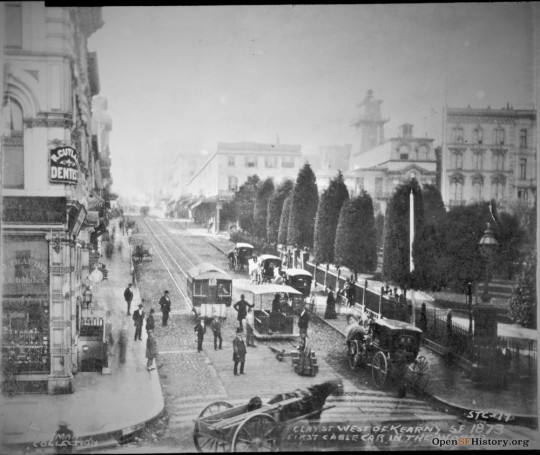
"Clay St. West of Kearny SF 1873 - First Cable Car in the World" In this elevated view west on Clay Street to the Clay St. Cable RR cable car at Kearny Street Terminus, Portsmouth Square can be seen on the right. Signage for the R. Cutlar Dentist, H. Traube watchmaker and jeweler at left. This photo is a detail from Carleton Watkins' stereo card number 2368 (Variant) under the original title: "Clay St. Hill R.R., San Francisco, Cal. Run by A.S. Hallidie's patent Endless Steel Wire Rope and Gripping Attachment. Overcomes an Elevation of 307 feet in a length of 2800 feet. Worst grade, one foot in six" (from the Marilyn Blaisdell Collection).
Chinatown at the Advent of the Cable Car
This year San Francisco marks the sesquicentennial of its cable car system. In the late 19th century, San Francisco experienced rapid urbanization and faced the challenge of its hilly terrain. Traditional horse-drawn streetcars struggled to navigate the steep inclines, necessitating an innovative transportation solution.
In the predawn hours of August 2, 1873, Andrew Smith Hallidie introduced the first successful cable car system in the world. The cable cars utilized an underground cable mechanism to propel the cars along tracks, overcoming the city's hilly landscape. This new mode of transportation revolutionized urban mobility and played a pivotal role in San Francisco's development.
Historian Phil Choy wrote about the Clay Street cable car terminus at Portsmouth Square as follows:
“Following Andrew S. Hallidie’s successful test-run of the first cable car on August [2], 1873, horse-drawn cars were replaced with a cable car on Clay Street. Thereafter, the Chinese called Clay Street ‘Mo Mah Lie Ch’eh,’ which literally means ‘no-horse-drawn-car’ [冇馬拉車; canto: “mou5 maa5 laai1 ce1″]. Starting from the top of Leavenworth Street, the line ended at a turntable at the bottom of Clay and Kearny Streets, to send the car back up the hill.”

California and Montgomery streets, c. 1889. Photographer unknown (from the Martin Behrman Negative Collection / Courtesy of the Golden Gate NRA, Park Archives). The view is west on California across Montgomery, as an Omnibus Railway Co. horsecar #11 passes the Parrott Building, or Parrott Block (1852, Architect Stephen Williams) seen in background. A Chinese man is walking south at the northeast corner of the intersection. The signs for the offices of Equitable Life and Dr. William F. McNutt at 405 Montgomery are visible at right.
The introduction of cable cars in San Francisco had a profound impact on the Chinese community. Several cable car lines conveniently passed through Chinatown, allowing Chinese residents to access transportation. The cable cars provided a reliable means of travel for the community, connecting them to other neighborhoods and employment opportunities initially for domestic workers serving the mansions atop Nob Hill and eventually throughout the city.

Clay Street Cable Car, c. 1873. Photograph by Carleton Watkins and published as “Pacific Coast. 2369″ and by Taber Photo (from the Marilyn Blaisdell collection). In this startling image, patrons and car operators can be seen posing on or alongside cable cars on Clay near Jones Street, except for at least two Chinese men seated in the car at left. Their faces were lost to history because one man placed his hat over his face, while the other inclined his head to avoid the camera’s lens. Watkins' image may be the only extant image showing urban pioneer Chinese actually riding an early cable car, possibly to their jobs as domestic servants for the mansions on Nob Hill.
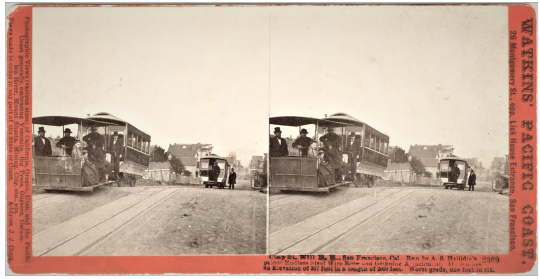
Watkins' stereo card bears the legend: “Clay Street Hill R.R., San Francisco, Cal. Run by A.S. Hallidie's patent Endless Steel Wire Rope and Gripping Attachment. Overcomes an Elevation of 307 feet in a length of 2800 feet. Worst grade, one foot in six. 2369” Photograph by Carleton E. Watkins (from the collection of the San Francisco Public Library).

“At the Corner of Dupont and Jackson Streets” c. 1896 -1906. Photograph by Arnold Genthe (from the Genthe photograph collection, Library of Congress, Prints and Photographs Division). A cable car on the Jackson Street line can be seen at right. “Two girls wearing embroidered holiday wear are crossing the street,” as historian Jack Tchen wrote in his book about Genthe’s Chinatown photos. “The store behind them is a ‘Chinese and Japanese Curios’ store located at 924 Dupont Street, southwest corner. The good-quality, expensive vases in the window display and the sign in English indicate that the store catered especially to tourists. Some such stores were owned by Japanese, but the main reason that both Chinese and Japanese goods were sold in the same store was that the general public could not distinguish between the two cultures.”
(NOTE: Both Genthe’s identification of the intersection of Dupont and Jackson streets and Tchen’s location of the address at 924 Dupont appear INCORRECT for several reasons: (1) Genthe’s photo of the upslope depicts the west or odd-numbered side of the street, and the intersection’s southwest corner; (2) Prior to 1906, the building bearing an address of 943 Dupont occupied the southwest corner of the intersection with Jackson Street;(3) business directories of the time indicated that the Tong Yuen Lai confectionary operated at the 943 address during the 1890’s (and by the 1905 publication of the Chinatown phone directory, the Jong Mee Cigar Store had either co-located or operated solely at the address); (4) local transit historian Emiliano Echeverria observes that Jackson Street served as a horse-drawn streetcar line but such tracks were removed "and 1894 was when they were removed,” which preceded Genthe’s photographic work in San Francisco; (5) the storefront of, and its occupancy by, a curios store at the southwest corner of the intersection of Sacramento and Dupont streets was apparent as confirmed by the city’s July 1885 Chinatown map locating a “C[hinese] merchandise & pawn store” at 625 Dupont Street; (6) the storefront is a closematch to the one seen at the intersection of Dupont and Sacramento streets appearing in the upper-left background of Genthe’s photo “Carrying New Year Presents” (included below); and (7) business and phone directories from 1883 through 1905 showed the Quong Wah Lee & Co. at the 625 Dupont Street address and classified by the Langley directory of 1883 as selling “Fancy Goods - Chinese and Japanese.”

“B 3096 Clay Street Hill, Chinatown, San Francisco” c. 1886. Photograph by Isaiah West Taber (from the Marilyn Blaisdell Collection). In this view east on the south side of Clay Street, and just above Dupont, the trees of Portsmouth Square can in the distance at left, a horsecar can be seen on Kearny and an original Clay Street cable car. The large billboard for Globe Business College and Conservatory of Music in distance. The large vertical sign in Chinese denotes an herbalist or apothecary store.

The view east on Clay Street, c. 1888. (Photographer unknown from the collection of the California Historical Society). A cable car is in the process of crossing Dupont Street and heading west up the hill. The balconies of the Yoot Hong Low restaurant appear at left.
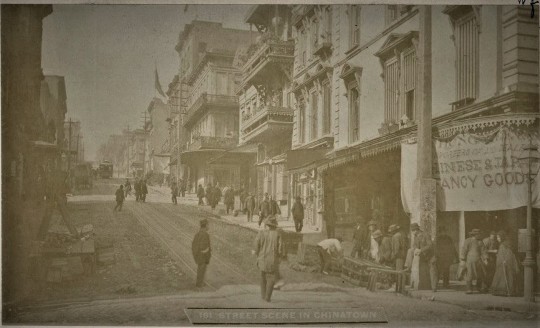
“161 Street Scene in Chinatown,” no date. Photographer unknown (from a private French collection). A cable car can be seen traveling west on Clay passing Stockton Street.

“Chinese Quarter, San Francisco, Cal.” c. 1891. Photograph by A.J. McDonald (from a private collection). A cable car is seen passing the 800-block of Clay Street between Dupont St. and Waverly Place. The decorated balconies of the Yoot Hong Low restaurant can be seen at center.

“B 2807 Lotta’s Fountain, and junction of Market, Kearny a& Geary Streets, S.F.” c. late 1880s. Photograph by Isaiah West Taber (from a private collection). A Market Street Cable Rail car appears in the right foreground. Two Chinese men can be seen in the background at left on the sidewalk between the two lampposts and under the Philadelphia Lager sign.

“Carrying New Year Presents” c. 1900-1905. Photograph by Arnold Genthe (from the Genthe photograph collection, The Library of Congress, Prints and Photographs Division). A cable car can be seen on the hill just behind the head of the young woman in the photo. She appears to have been a servant to the family of prominent merchant Lew Kan. The boy in the photo is Lew Bing Yuen, the older son, who also appears in Genthe’s well-known photo “Children of the High Class.”
The cable cars lines had played a significant role in fostering economic growth within Chinatown before the earthquake and fire of 1906 that destroyed the neighborhood. After the transformation of post-1906 Chinatown into the “Oriental City,” this urban transit network remained crucial to the neighborhood’s integration with the citywide economy. Tourists and locals utilized the cable car system, and Chinese-owned businesses along, and in proximity to, the cable car lines experienced increased patronage. This urban mobility represented by the cable car system, even after its reduction to only two lines, has sustained the Chinese community from it pioneer beginnings to this day.

“San Francisco Cable Car Lines at the Fullest Extent of Operation (1890s)” (courtesy of the Cable Car Museum). As the Cable Car Museum advises here, “Clay Street Hill Railroad was the sole cable car company for 4 years. A former horsecar company, Sutter Street Railroad, developed its own version of Hallidie's patented system and began cable service in 1877, followed by California Street Cable Railroad -1878, Geary Street, Park & Ocean Railroad -1880, Presidio & Ferries Railroad -1882, Market Street Cable Railway -1883, Ferries & Cliff House Railway -1888, and Omnibus Railroad & Cable Company -1889.” At its peak, the San Francisco companies had laid “53 miles of track stretching from the Ferry Building to the Presidio, to Golden Gate Park, to the Castro, to the Mission.”

Published in Germany under the title “The Plaza, near Chinatown, San Francisco, U.S.A.” c. 1890. Photographer unknown (from the Marilyn Blaisdell Collection). In this northwesterly view toward the 700-block of Washington Street, a man walks a child through Portsmouth Square, and a cable car can be seen in the background. By the 1890s, a cable car line had been built on Washington Street, running along the northern edge of the square.
For the Chinese families who began to populate the eastern slopes of Nob and Russian Hills (and the garment workers in the small sewing factories along Pacific Avenue west of Stockton Street), the cable cars served as their principal transit system until the establishment of bus routes such as the Pacific Avenue shuttle (championed by Phil Chin and his Chinatown Transportation Improvement Project crew a half-century ago), and now known as the no. 12 Folsom/Pacific line.
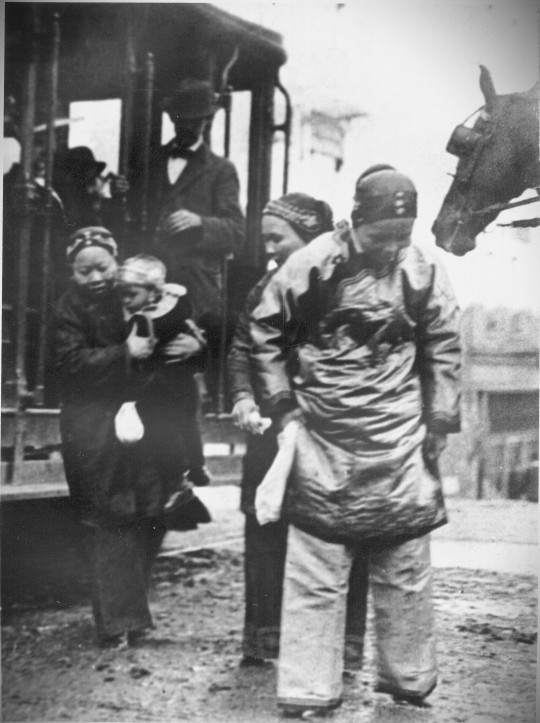
A group of women (at least one of whom has bound feet) disembarks from a cable car in 1908. Photographer unknown (from the collection of the Chinese Historical Society of America). For women with bound feet (including great grandmothers on both sides of my family), the cars represented not only convenience but a necessary travel option for the residents navigating the hilly topography of San Francisco Chinatown.
The clang of cable car bells and the snap of the cable in the tracks remain an integral part of the soundtrack for the several generations of Chinese children who grew up in the greater Chinatown area.
Cable cars symbolized the vital role of urban transportation in fostering connections and opportunities -- providing convenient travel options for the residents of Chinatown, maintaining the neighborhood’s economy during hard times, and tying the segregated Chinese community to the larger city.
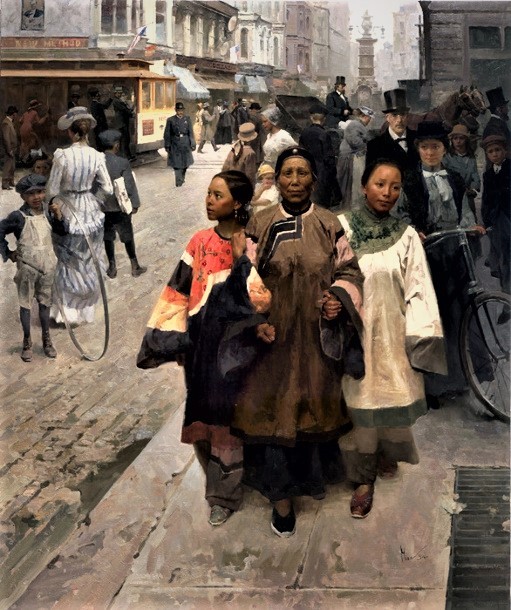
“Convergence of Cultures” oil painting by Mian Situ.
[updated 2025-1-17]
#Chinatown and the cable cars#Chinese riding 1873 cable car#Carleton Watkins#Andrew Hallidie#Clay Street cable car line#Chinatown Transportation Improvement Project#Lew Kan#Lew Bing Yuen#Sacramento Street cable car line#Jackson Street cable car line#Market Street Cable Rail line
4 notes
·
View notes
Text
[Image ID: Series of tweets from Shane Morris (@/ IAmShaneMorris) on 21 May 19 reading: Y'all wanna hear a story about the time I accidentally transported a brick of heroin from Los Angeles to Seattle? I bet. Alright, let's do this... (a thread)
I was living in Newport Beach, California, kinda just -- trying to figure life out. My buddy Tyler calls e up out of the clear blue, and he's like, "Hey dude, you wanna do the most epic road trip ever?"
I'm like, "Sure."
At the time, Tyler was a boat mechanic in South Florida, so I fly down to Miami, and I end up staying with one of his coworkers for a few days, until I can buy a Honda Shadow 750 for like $2,700. (He already had one, so I got a matching bike so we could share spare parts.)
From Miami, we set off across the United States, staying at the kind of motels along the way you see on movies like No Country For Old Men. If you're going to ride across the United States on a motorcycle, do it on two lane roads. It's worth it.
We end up swinging down through Mexico, and this isn't really important to the story, but we pulled over to rest in the middle of the desert, and these wild horses walked up to us, and were actually like... oddly friendly. They let us pet them. It was super cool. Anyway...
After like 10 days, we made it back into Southern California. He had an uncle in Temecula, and my ex was in Newport Beach, so we both rested for a few days. Riding a bike across the country takes a toll of your body. So we decided to switch it up.
We decided to sell our bikes, and buy a 1979 Dodge Ram van. I want to say we paid like $600 each for it -- $1200 all in. It needed a little work, but the important part was it was all easy stuff. We named the van Cassandra, and wrote our names on the door.
Picture of two people standing in front of a van. Picture of two people sitting on the curb next to a van.
The plan was easy: We'll drive up the Pacific Coast highway, and camp all along the way. We took the middle seats out of the van, so we could sleep in it at night incase it was raining. Then we went to REI to get hammocks for hammock camping.
On our way up, we stopped in Santa Barbara, and picked up my sister. At the time, she was in school at UCSB, and she was planning on flying home to the Bay Area to see our dad, so I was like, "Just come camping on the beach with us." So she did.
2 people standing on the beach.
Driving north, we made it so pretty cool spots, like Bixby Canyon Bridge. All along the way, we're letting anyone who meets us write their name on the van and take a picture. It was... fucking awesome.
Picture of a person sitting on a bridge. Picture of 2 people standing on the edge of a cliff next to the van.
Around Big Sir, our van had its first problem. The rear drum brakes were making awful noises, and locked up. I ended up buying a set of Craftsman tools, end then I did a brake job in the parking lot of a Wal Mart.
While I was there, I was like, "I'm gonna do a few other things." When I got the van, I changed the oil, and... that's it. (I know I should have done more of a tune up, but honestly, the van was running fine. The interior was even pretty nice.)
On these old Dodge vans, the engine access is inside the car, in between the driver and the passenger. I hadn't even lifted it up when I bough it. (I'm an idiot. I know.) So, I decided to change the spark plugs, the fuel filter, and the air filter. I'm So glad I did.
I opened up the engine cover, and sitting right on top of the engine was like, grass, straw and little bits of carpet. A mouse had made a home, right there on top of the engine block. I'm lucky it hadn't started a fire. So I cleared everything out, and changed the plugs/filter.
I remember yelling at Tyler, because he was the one who poured the oil in, and I was like, "How the fuck did you not notice there was a fucking rat's nest on top of the fucking engine block when you were pouring in the oil?!" And he was like, "It's an old car." LOL. WTF.
So anyway, we drive up into Oakland, and meet up with my friends there. We stayed at their house overnight, smoked weed, ate a meal, and chilled out. Then, we set off for Mt. Shasta, and Lake Shasta. (It's a really beautiful lake.)
Picture of a group of people standing in front of the van.
We camp at Mt. Shasta. It's beautiful. The lake was really low, but the water felt great. (Not really critical to the story, but go if you ever get the chance.)
Picture of two people around a campfire. Picture of a bridge.
Finally, we get up into Oregon, into the Cascades, and head into Washington. The whole time, we're hiking, camping, spending time in nature... it's really just one of the coolest experiences of my life. (Not sure what summit this was.)
So, here's the thing about old cars with carburetors - you needs to adjust them for altitude. An ideal fuel ratio at sea level is called stoichiometric -- which means 14.7 parts air, to 1 part fuel. As you gain altitude, you need to lean out your carb jets.
Mount Jefferson is something like 10,000 feet, so as we're driving up, probably around 6,000-7,000 feet, the van starts running way too rich. It was obvious. So... I was like, "Tyler, pull over. I'm gonna lean out these jets."
One a single barrel carb, you're only dealing with a few screws and springs, and basically.. you just kinda guess at it. (LOL.) So, I'm just listening to the engine, and then I would reach over and tap the gas pedal to see how it sounded.
So, Tyler steps out of the van, and I'm hunched over the engine, just twisting on the screws, and I hit the gas, and Tyler is like. "Holy Shit!" At first, I'm like, "Oh my God, something is on fire." So I pop up, and look around and I'm like, "What?"
Tyler, is like "What the fuck is that? I look down at the carb, and I'm like... "I dunno? Which part are you looking at? Does something look broken?" He's like, "No Dude! Look On The Cover!"
I look to my left, on the underside of the engine cover, and there's what appears to be a brick of aluminum foil, and it's taped up with aluminum tape that clamshell cover. Immediately, I'm like, "Oh shit what the fuck?"
So, I stop what I'm doing, turn the engine off, and start slowly prying this aluminum brick off the underside of the clamshell. Tyler is freaking out. (He doesn't do drugs.) He's like, "Oh my God! It's like on cops when they find drugs hidden in the car!"
I get the brick untaped, and then undo like seven layers of foil. They used a Lot of foil on this thing. What I found was a white, perfectly shrink wrapped brick. I thought it was coke, so I cut open a bit of the corner, put some on my finger, and rubbed it on my gums.
Edit of Finn and Jake from Adventure Time with flames and a galaxy background with text reading: Drugs.
If you've ever done coke, you know it's kinda hot, and then it makes your gums numb. This definitely wasn't coke, and I'm not the type of dude who does heroin. (Just, don't do heroin. Seriously. It's no good.)
So, Tyler and I are standing next to each other, when I hear tires on the gravel behind us. Let me paint you a picture: We're standing there with the hood up, clamshell open, side by side, with a brick of pure heroin.
Who do you think rolled up?
Man, a goddamn Park Ranger rolls up behind us. Just so you know, park rangers are the police. They have guns, and they just happen to work in a park. They can arrest you and everything.
I'm holding a brick of heroin in my hands, and there's a park ranger 30 feet behind me. So I reach down, and pretend to go into my tool kit. Thankfully my hands are greasy as hell, and I can pick up some tools. So I slide the brick under the seat.
I pop around with and pretend I'm putting a socket set on a breaker bar, and I'm like, "Oh hey there. How can I help you?" The guy is like, "You guys having trouble?" I'm like, "I'm just trying to jet the carbs." He's like, Oh, I remember doing that when I was your age."
Then he's like, "You ever done it before?" I'm like, "I'm kinda just learning as I go here. We're from California." The dude laughs and he's like, "Here, I'll show you."
So the ranger walks over, and he's like, "I remember these old Ram vans. So much room."
We open up the clamshell, and this guy's knee is like two inches from this brick. Man, I'm trying so hard to act normal, but Tyler? He's not playing it cool at all. He's like, "You know, I'm sure Shane can figure it out. We don't need you wasting your time on us."
The ranger is like, "Oh it's no big deal. Most of the time I'm just telling people to put their trash higher up, so the bears can't get to it." So he's just chatting with us, and I'm telling him how we bought the van and drove all the way up the coast, etc.
Finally, we get the jets set, and the ranger is like, "Alright, you boys stay safe." Lile, he had no clue he was probably two inches away from the biggest drug bust in the history of Oregon state parks.
Once he drives off, Tyler is freaking out, "Oh my God!? What are we gonna fucking do, man?" I'm just like, "Uh, we're gonna make a shit ton of money selling a brick of heroin." So, I wrapped it up, and just stuck it in the bottom of the cooler in freezer bags, under the ice.
Then, we drive up into Seattle, and I call one of my buddies who I know sells a shit ton of weight. I'm like, "Yo ******, we need to talk." I won't go into all the details, but I managed to sell it all to one person. It was lower risk. Plus, I'm not a drug dealer.
For the record, my buddy Tyler wouldn't take any of the money. Eventually, I convinced him to let me give him $600 for the van, so I could say I bought the van myself. (The van was in his name.) But this story isn't over yet...
I end up selling the van to some hippies from Ashland, and then move to Atlanta. About a year goes by, and I'm not even thinking about this van anymore. Then I get a phone call from a number I don't know. I let it go to voicemail.
The same number calls me again, 30 seconds later. So I answer it. "Hello?" The voice on the other line: "Hey, can I speak to Shane?" I'm like, "Speaking?"
Dude is like, hey, my dad gave me your number. He said he sold a van to you about a year ago?
Immediately, I'm like, "Yeah, he sold me a van." The guy is like, "Wow, that's great news. I'm so glad I found you. So, I don't like to talk about this, but I was in jail. I had a substance abuse problem, and I ended up going to jail because I made some mistakes."
I'm thinking, "What's the angle here?" So I'm like, "Oh, well -- that sucks. Anyway, how can I help you?" So the dude goes into this crazy ass long story. He tells me about how he has so many memories with the van. Yeah, it was in his dad's name, but it was his first car.
"I know it's just a beat up old van, but I'd really like to buy it back from you. Dad says you paid something like $1200 for it. I think I'd be willing to go as high as say, $1800 to get it back. The memories are just worth that to me."
The light goes on in my head. Jail. Substance abuse. He wants the van back. He is willing to pay $600 back over what I paid for it. (Street value, bagged up, if you slow-sell it, there was something like $40,000 worth of heroin in that brick.) This dude wanted his brick back.
The guy didn't go to jail because he had a substance abuse problem. No heroin junkie can afford $40,000 in heroin. The guy did tie because he was the plug. So... I decide to make some money.
Picture of Phoebe from Friends doing an evil laugh
I don't own this van anymore, but I definitely know who I sold it to, and I know I can buy it back, so... I start spinning a story. I'm like, "Man $1800 just won't do it. I've put a lot of money into this van, and it's really running like a top now. It's my daily driver."
He's like, "Oh yeah?" I'm like, "Yeah dude. She's in great condition. I redid the carb, the breaks, all the fuel lines, put some tires on it, redid the carpet on the interior, a lot. I've probably put at least $5,000 into this thing." He's like, "Wow, you really did a lot."
So he's like, "Where are you located?" I'm like, "Oh, I'm up in Ashland, Oregon." (Remember: I was in Atlanta.) He's like, Oh, that's not too bad. If it runs as well as you say, I may just drive up there with a friend and then drive it back down here."
So finally he's like, "I respect that you put a lot of work into it. Like I said, the van has a lot of sentimental value to me, and I'm glad to hear you took care of it. I think I could offer you $6200. That's what you paid for it, plus the $5000 you say you invested."
So I said, "Alright, you have a deal." As soon as we hung up, I called the people in Oregon I sold the van to (I kinda sorta knew them through friends), and I was like, "Hey, do you still have that van?" They're like, "Yeah, but it's not running." I'm like, "Oh?"
I was like, "You care if I buy it back from you?" The guy was like, "Dude, I'll sell it for $100 if you just get it out of my driveway." So I was like, "Sold." I booked a ticket to Portland the next day, and then rented a car, and drove to Ashland.
Along the way, I called up the old owner of the van's son, and I'm like, "Hey will you be free to drive up this weekend?" He's like, "Oh yeah. Totally. I can come up." It will only take me two days to drive up there." It was Tuesday. We agreed to meet on Sunday.
I fly into Portland, rent a car, and then get to Ashland on Wednesday. I go to an auto parts store, and buy a battery jumper kit, and some hand tools. I need to get the van running. I go to see the van, and it's sitting there, pretty dusty, but otherwise okay.
TL:DR -- the only thing wrong with the van was a bad battery. This couple just didn't want to spend any money on the van, because they had recently purchased a Subaru Outback. (Go figure. It's Ashland.) So, I changed the battery in an auto parts store parking lot.
Then, I took the van to one of those self cleaning car wash places, and gave it a good wash and vacuum. Honestly, it cleaned up really nice. At this point, I decided to check in with the guy, and kinda fuck with him a little bit in the process.
The guy answers really fast, and he's like "Shane! Hey buddy, what's up?" I'm like, hey, I do want to mention one thing about the van, and I hope this doesn't change your plans about buying it." He goes silent. "What's up?"
I was like, "I don't want you to be mad but, uhm, after I bought the van, my friends and I... we uh... we wrote on the outside of it with permanent marker. I can't get it off. I tried." And I hear him sigh like Hella loud. "Oh, that's fine. I can repaint it."
I'm like, "I want to be fair on the price, because I didn't tell you. So... how about I knock $200 off? I just want to pay whatever is fair to get the marker off." He says, "Thanks for telling me. I'll accept the $200 discount. See you Sunday?" I'm like, "Yup!"
So, next things next: I need to make a fake brick of heroin. So I head to a Goodwill, and buy a medium sized paperback book. It was "The Pelican Brief". I thought that was a funny detail for some reason. (Good book. Also a good movie.)
Then I get in my rental, and took off to Medford, because I couldn't find aluminium tape anywhere near Ashland. I got there, got my tape, and then bought some heavy duty foil in a grocery store. From there, I drove back to Ashland.
Making the fake brick was actually pretty easy. I just wrapped it up the same way I remember the brick being wrapped, and then taped it down with aluminium tape the same way I remember it being taped--kinda like a tic-tac-toe board. They had taped the Shit out of it.
Then... I just kinda waited. On Friday, I got a phone call from the dude letting me know he was on the road, and I said "Hey, my mechanic says we can use his bay in case you want to inspect it." And the dude was like, "Oh that won't be necessary." I'm like, "Oh I insist."
On Saturday, I called a local mechanic and I was like, "Hey, I'm selling my van to some people from out of state, and I was hoping I could give you $50 in case they want to use one of your bays to look under the care for a moment?"
(Car buying tip: Any mechanic worth his salt will take you up on this offer. It's good for both the buyer and the seller to have a mechanic take a look. They know they'll be getting any work on any fix they identify.)
We meet at this local shop on a Sunday afternoon. The guy shows up in a late model, silver Nissan Altima. He's heavily tattooed, and so is his friend. These guys look like real, OG, Mexican bangers. Like, dude is wearing the blue Nike Cortez's and Dickies. It's That look.
Immediately, I realize these aren't the soft dudes I think they are. They're real gangster, they move real weight, and I'm doing something incredibly stupid. I'm about to rip off two guys who look like they bury people neck deep and let coyotes eat your face off.
But I'm there, and they're in front of me, so I gotta go through with it. So I give them a tour. We walk around the van. It's clean. It has tire shine on it. I've washed it, and even waxed it. It looks as good as a 1979 Dodge can look.
The guy is like, "So you've done some engine work?" I'm like, "Yeah, carb, plug wires, distributor, etc." He's like, "Can I take a look?" So I help him lift the clamshell, and there's no rats nest, it's looking clean-ish... and it's sort silent. So I talk...
"When I got in here, there was a Huge rat's nest. I cleaned that out, then I got to work on the carb, the plugs, wires, belts, hoses. It's all new in there." Then, the dude reaches over, and straight up taps the aluminium brick. I start sweating. He looks at me. I look at him.
The first thing that came out of my mouth was. "I didn't bother redoing any of the heat shielding on the clamshell. Honestly, I prefer having some heating coming off the block in the winter, but I can see why you did it. Southern California is hot."
I was trying so hard to play it dumb as hell, and I sold it. He says back to me, "Yeah, this tape costs about $20 a roll, but it's worth it to beat the heat." I laugh, "Yeah, the AC just barely works. I think you've got a leak in the system somewhere."
Then he throws a curveball at me. "Can I take it for a drive?" I'm like, "Oh totally." He's like, "Do you mind if my friend drives behind me, in case it breaks down?" I say, "Oh you go right ahead." At this point, I'm thinking he's going to drive off, never to be seen again.
He's gone for about 20 minutes, and then he comes back. He's got a big smile on his face, and he's like, "Wow, it still drives great. Let's negotiate." So I'm like, "Well, you did say $6,000?" He comes back at me and he's like, "Well, I gotta ship this van back."
I'm like, "Okay, well... what's a fair price?" He says, "You have the title here in your hands?" I say. "Well, actually, I had to do a lost title But I can mail it to you in like a week." (The reality was I did, but I hadn't done the transfer from the couple yet.)
He's like, "Alright, you know, you seem like a good guy. You can mail it in a week?" I'm like, "Yup." He says, "$5000. Because it'll cost me $1,000 to ship. You're a wild man for driving this old beast as far as you did." So we shake hands. It's a deal.
I have a notepad with me, and I say, "Alright, let me write you up a bill of sale." So I write his name, and my name. His address, and my "address" (a local Ashland address where I definitely have never lived), and the "cost" of the vehicle. This is a funny wrinkle...
I said to the guy, "Hey, I'm going to write on the bill of sale that you only paid $1,000 for the van, so you can avoid paying more taxes in California when you go register it." (You pay taxes on the sale.) He's like, "Oh, thanks. I didn't think of that."
Using the hood to press on, I sign my name, he signs his, and then he's like, "Alright, here's the $5,000. Cash." So he hands reaches into his pocket, and when he does, he moves his shirt in such a way that he obviously exposes a gun in his waistband. He pauses.
As he's handing me the cash, he smiles and says, "Thanks for taking care of my van, Shane. I'm relieved to see you left my heat shielding how it was. There's a lot of value in heat shielding. Some might say it's worth quite a bit." He gets this look in his eyes. It's dark.
He continues. "You seem like a smart guy. Smart guys don't talk about things they find. They might even buy new aluminium tape, but be careless enough to leave the roll in the back seat." My throat turned into a knot. Like, my whole mouth went dry as fuck.
He stares into my fucking soul. Like, Into me, fam. Then he gets this big ass smile on his face grabs me by my shoulder, and he smiles, "If you were even smarter, you would have asked for $10,000." The he starts laughing, and the guy he's with starts laughing.
"You know, you're a hustler Shane. What do you do?" I breathe a sigh of relief. "I'm a web developer." He says, "You could have been a stone cold hustler in another life. I've never been hustled before, but you had the cajones to get your money. I like that."
They hadn't checked to see what was inside the foil. The only knew that I taped it back. So I went with it. "Well, you know. I found it when I was working on the van. I just didn't know how I'd ever sell it, so it's been in my freezer for a year now." He busts up laughing.
"Homey, you kept it in the freezer? That's wild man." So then we just sorta chop it up outside this mechanic's shop for about 20 minutes. He and I had the same taste in rap music. I wanted to just keep him happy. I was trying to think of my exit plan.
Finally, he's like, "Alright, you know I don't want this van, but ship it to me anyway. Here's $5,000. Keep the change." To be clear -- he had give me $5,000 already for the van, and then gave me Another $5,000. I played it cool. "Close enough to $10K." I dapped him up.
As soon as they left the parking lot, I sprinted into the mechanic's office where he was sitting, and he was like, "Son, that was the most obvious drug deal I have ever seen. I already called the police." I felt my heart go from 0 to one million.
Then the mechanic winks at me, and he's like, "I'm just fucking with you. Man, this is Oregon. Everyone smokes weed. Calm down. I didn't call the cops." He sees my face, and he's like, "You should have seen the look on your face." (I wasn't amused.)
The problem was, the clock was ticking. I didn't know when those dudes were going to open the foil and realize I'd just hustled them, so I was like, "Hey, if I give you $200, will you let me keep that van parked here for two days until I can get it shipped?"
He's like, "If it's here longer than two days, I'm gonna charge you. If it stays here, it's mine." So I was like, "That's fine. I'll be back" (I knew at that moment the van was going to belong to him. I was never coming back. Most states have laws for mechanics like that.)
I walked out of the mechanics office, and then walked literally seven miles back to my rental, parked at my little motel. Ashland is a small town, and I had picked the cheapest motel. I wanna say it was like a Super 8 or something?
The road this motel is on is like, pretty long and straight. Like, you could see a full quarter mile down the road, no problem. As I'm about 400 yards away from the entrance, I see a silver Nissan Altima pull in, and go to the front office.
As I walk closer, I see two guys get out, and I realize it's the same guys. They haven't seen me, but we're staying at the same fucking motel. So, I start speed walking. When I check in, it took a while, so I knew I needed to hustle so I wasn't seen.
I took off the flannel I was wearing, so I'd be in a white tank top. I folded the flannel up super small, and walked as fast as someone can walk without looking like a moron. My room was on the back side of the motel, upstairs.
Basically, as soon as I cleared the vision line of the back wall, I went into a full sprint, and ran as fast as I could up the stairs, and into my room. No sooner than the moment I slammed my door, I went over the the drapes, and peeked out. The silver Altima was driving around.
I shit you not, these guys parked two spaces away from my rental car, and their room was Directly below mine. It's a damn cheap hotel, so I could kinda/sorta hear them talking. Not word for word, but definitely the vocal tones, plus their TV.
When I saw I was quiet as a mouse, I mean, I just sat in bed, didn't turn the TV on, didn't move, and when I had to pee, I held it. I was terrified. Then... I heard it.
I heard the guy yell. (start all caps) "Motherfucker! I'm going to fucking kill him!" (end caps) Then I hear them screaming, but it's not clear what they're saying. They yell for like 15 minutes. Then they get quiet. My phone rings. It's a blocked number.
I sent it to voicemail. It rings again. Blocked number. I sent it to voicemail. Then, I hear them yelling a bit more, and then I hear the door downstairs slam. I peek out of the little gap in the drapes, and watch them take off.
As soon as I saw the car clear the corner, I left.
I grabbed my backpack, flew down the stairs, and got into my rental. I was getting the fuck out of Ashland before I got killed. I had been on the road about an hour when the guy calls me again, this time, from his real number. Not a blocked number.
I answered, "Hey M*****, What's up?" He's yelling, (start all caps) "We've got a fucking problem! You need to bring me my money, right now!" (end caps)
I was did what I do, and talked shit-- "I take it you're not a big fan of John Grisham novels. You should really give him a chance before you get angry."
The dude flew off the handle. Like he's just shouting. (start all caps) "Motherfucker I will kill you!" (end caps) over and over, so finally I'm like, M****. Calm down. Just listen. I think we can make a deal here." So he gets a little less on edge. "What's your deal?"
I said, "Look, I know you're staying at the (Whatever) Hotel. We'll meet up there. You show me you've got your gun on the hood of your car so I know I'm safe." He's like, "Okay. And?" I said, "Then, I'll take back The Pelican Brief, wrapped in foil."
"... and then I'll give you what you really want. A Tom Clancy novel. Everyone loves war fiction." He got quiet. He didn't say shit. "I'll fucking murder you, Shane. You robbed me. You fucking die from this." Then he hung up.
In 2017, the guy I ripped off for his brick of heroin was found guilty, with four other guys, of raping and murdering a 13 year old girl. They were all prominent MS-13 gang members. He got LWOP'd in his sentence. So it looks like he won't be killing me.
... and that's the story of the time I bought a van with a brick of heroin in it that belonged to an MS-13 gang member, sold the brick, and then sold him his van back with a wrapped up John Grisham novel, for $10,000. Somehow, I didn't die.
/thread /End IDs]
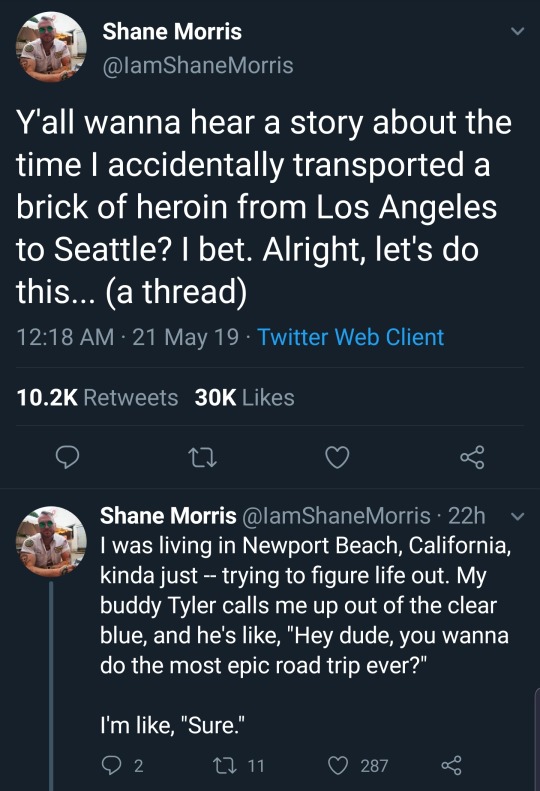
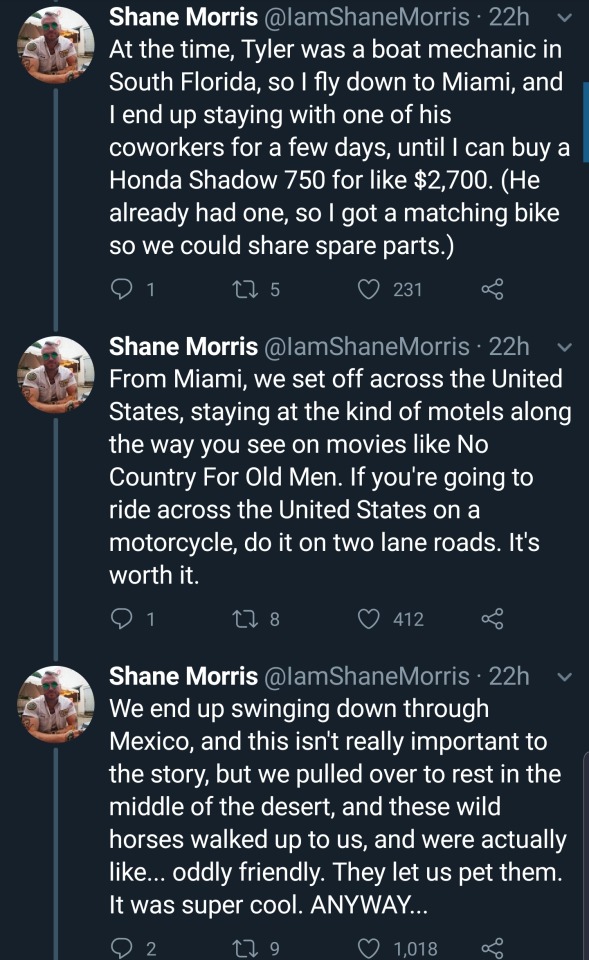
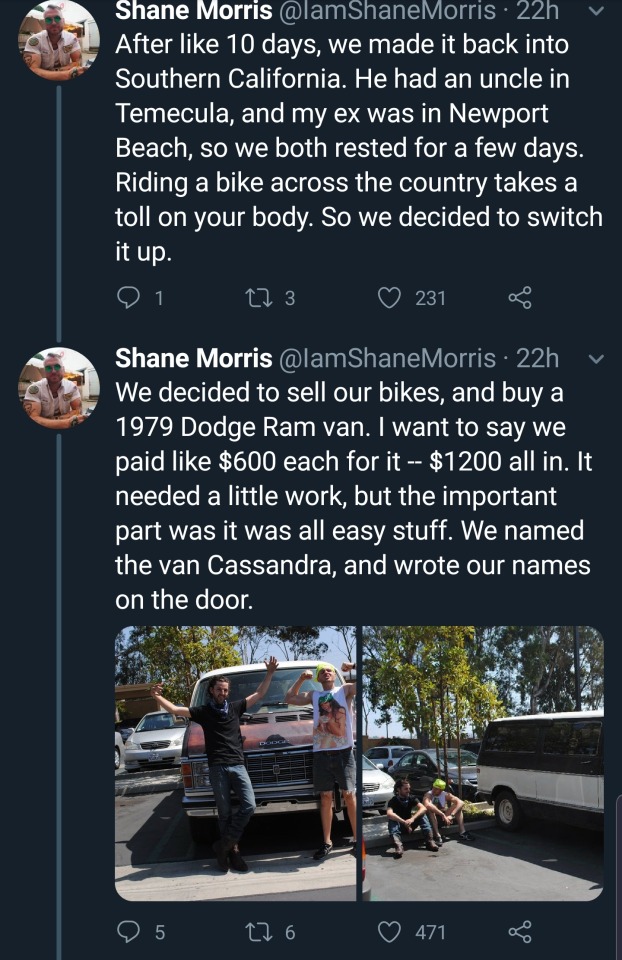
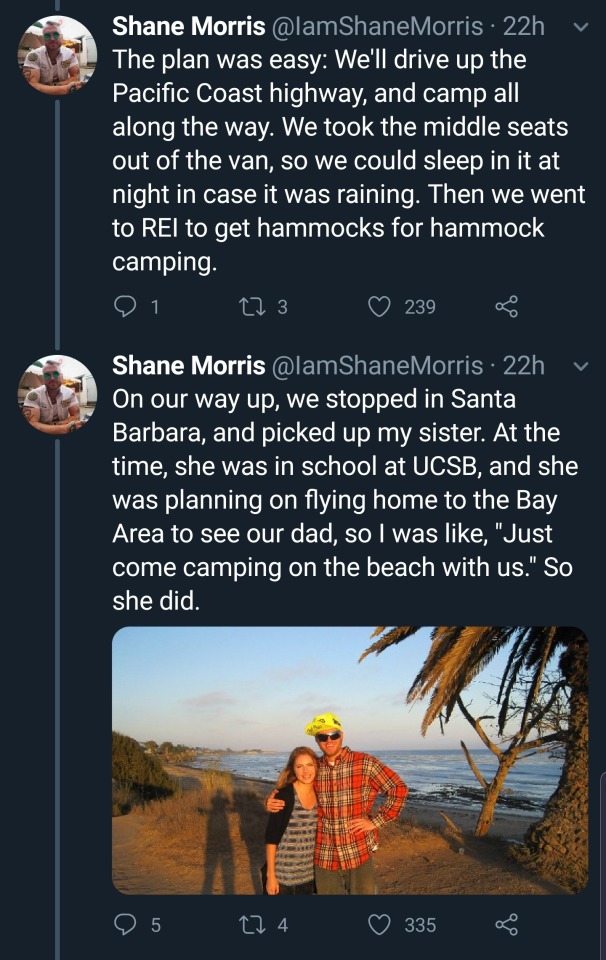
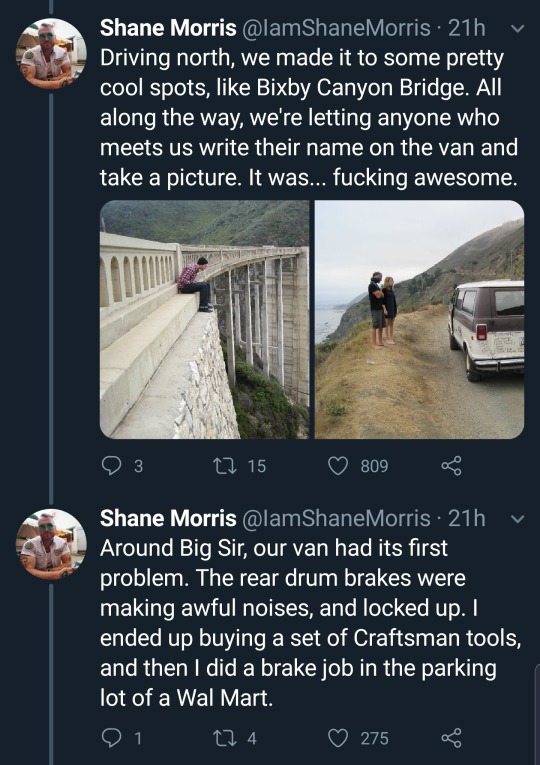
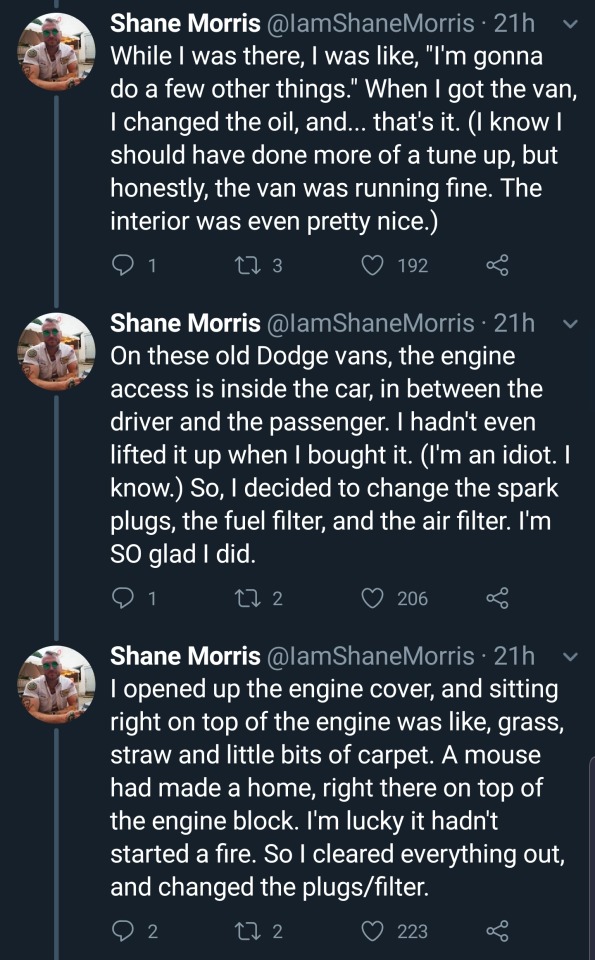
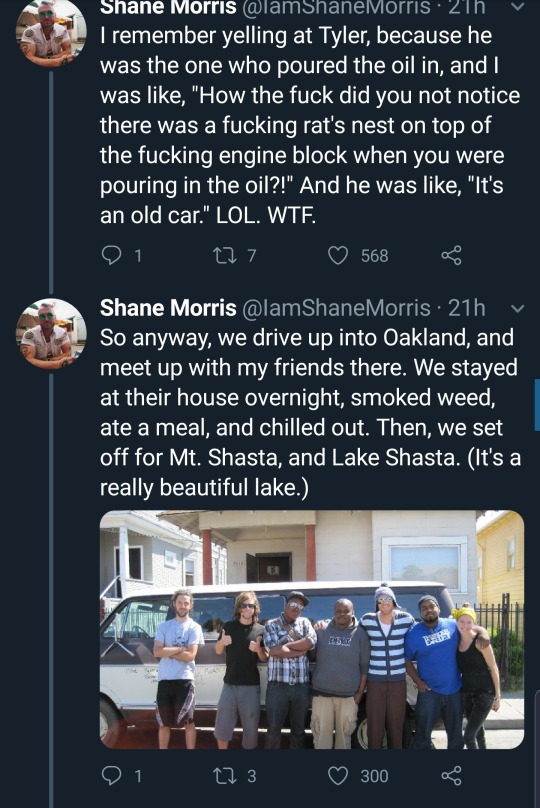
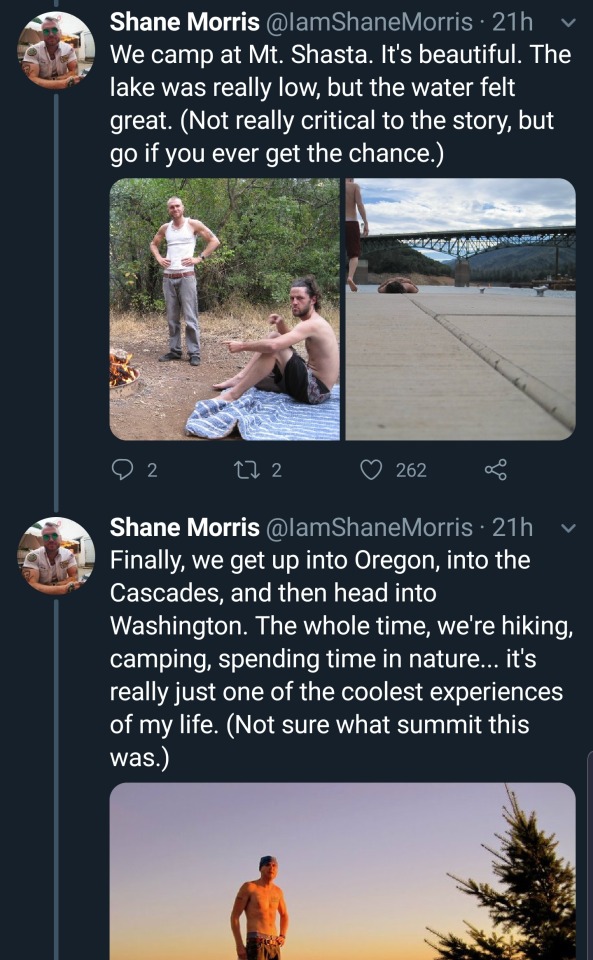
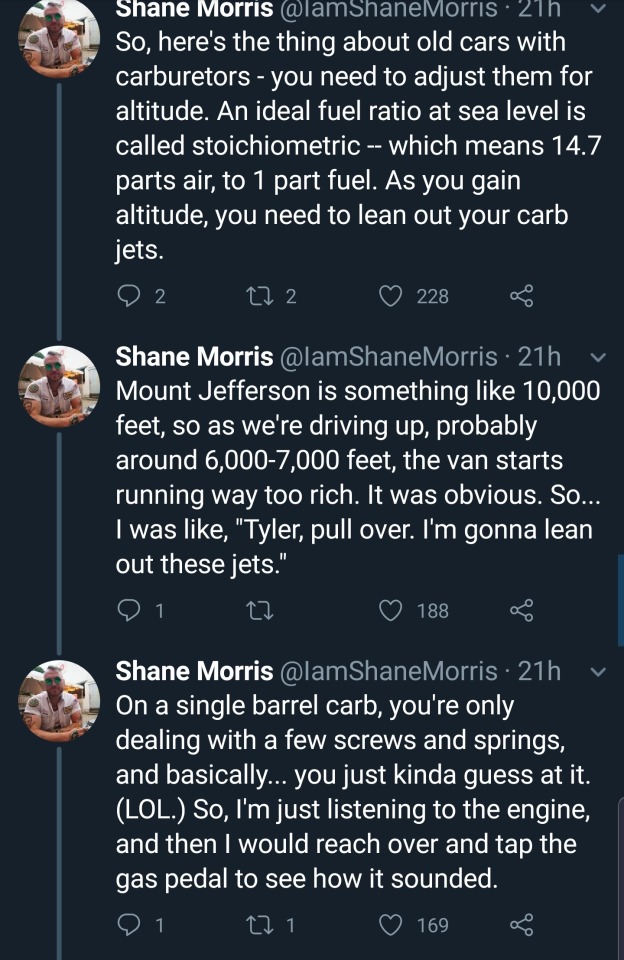
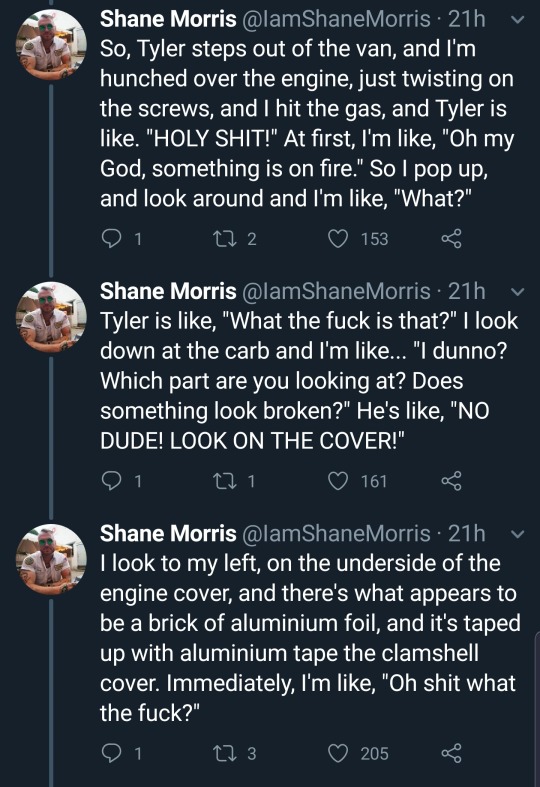
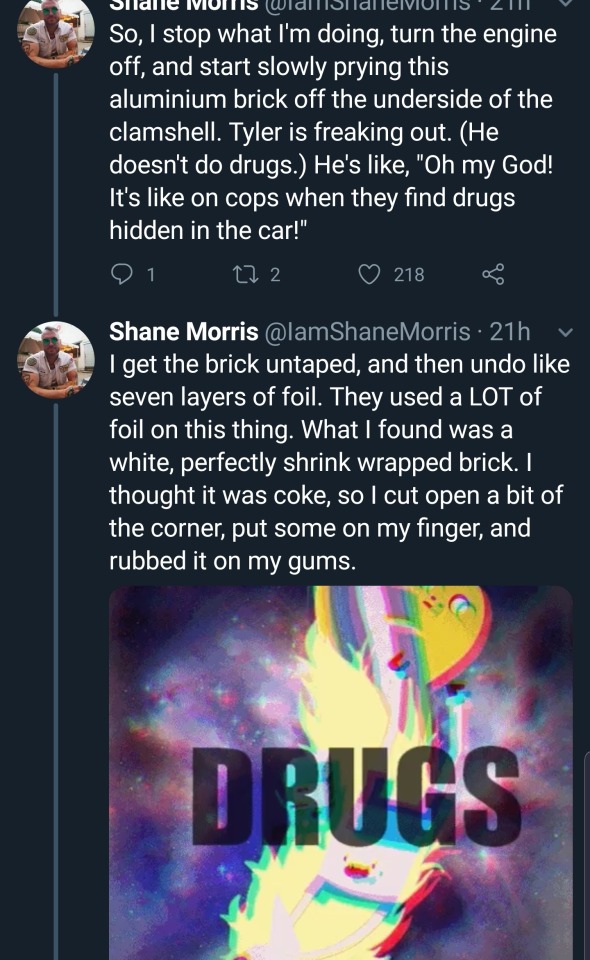
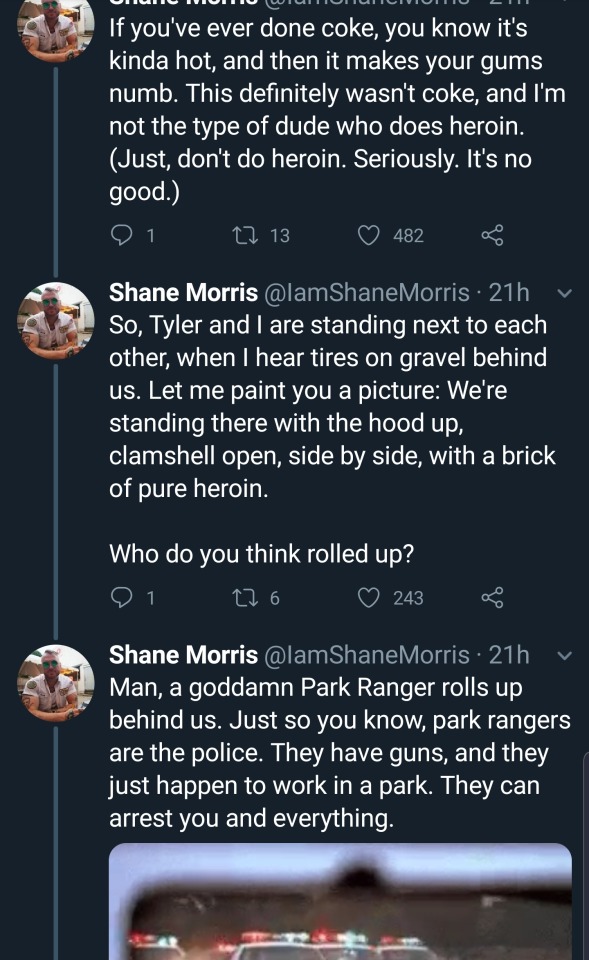
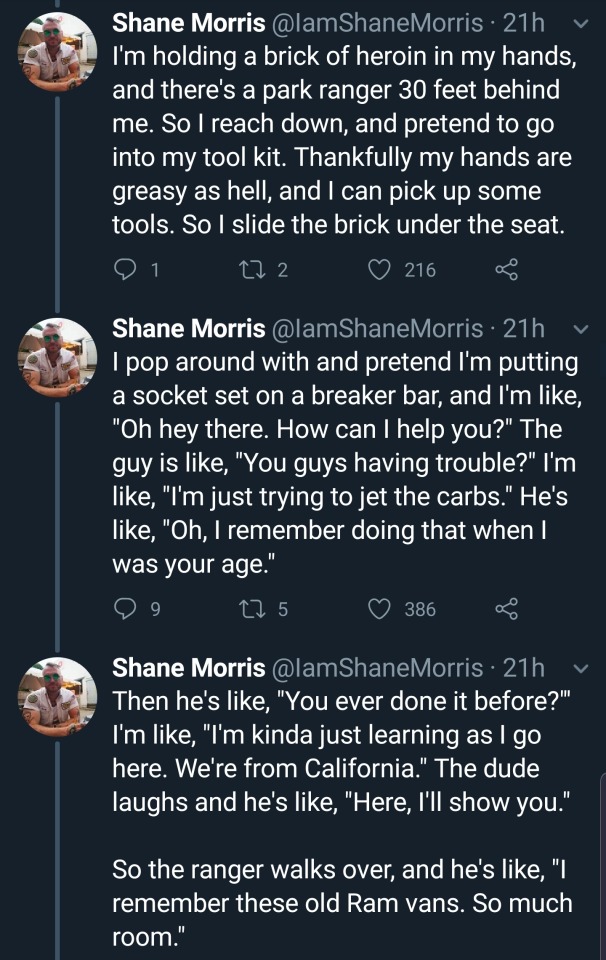
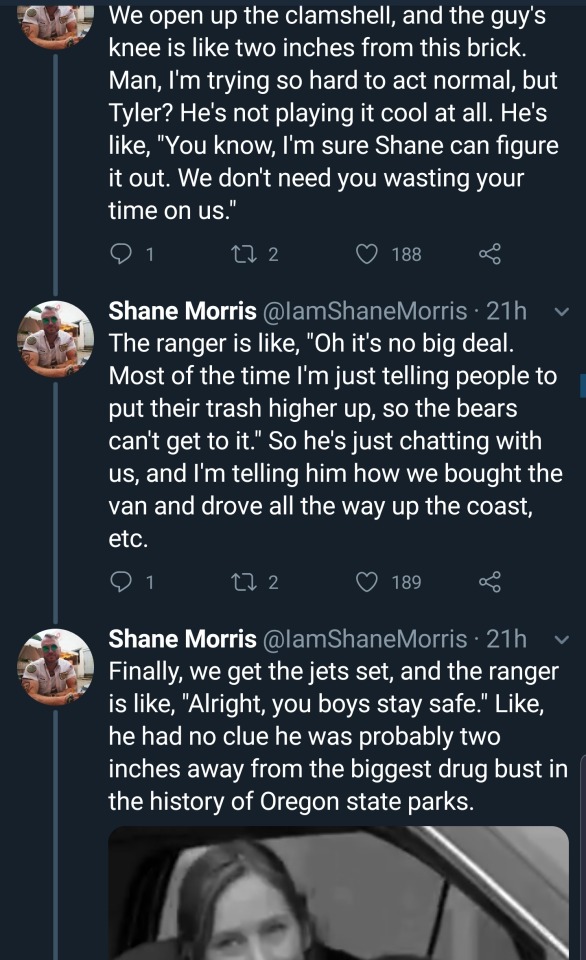
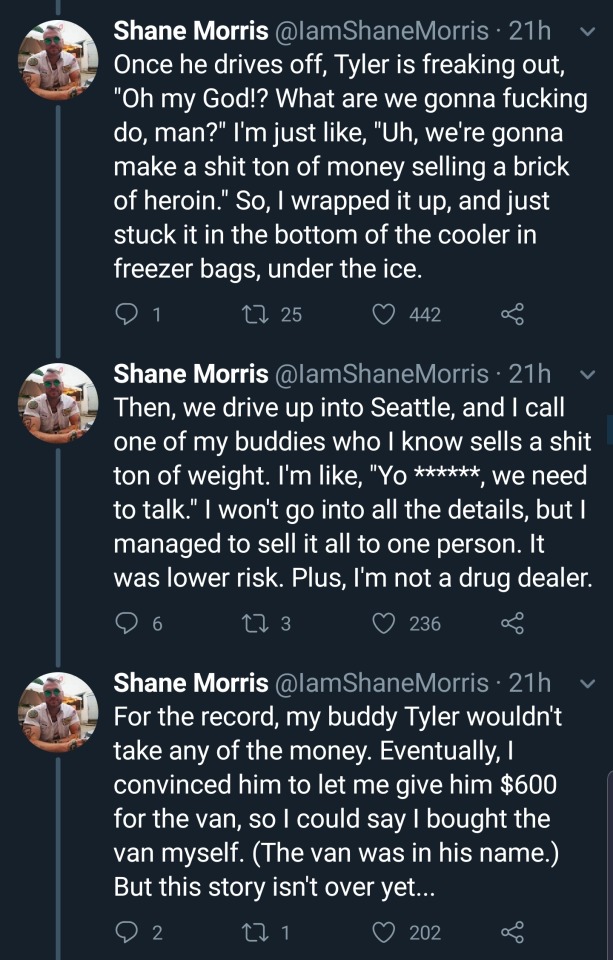

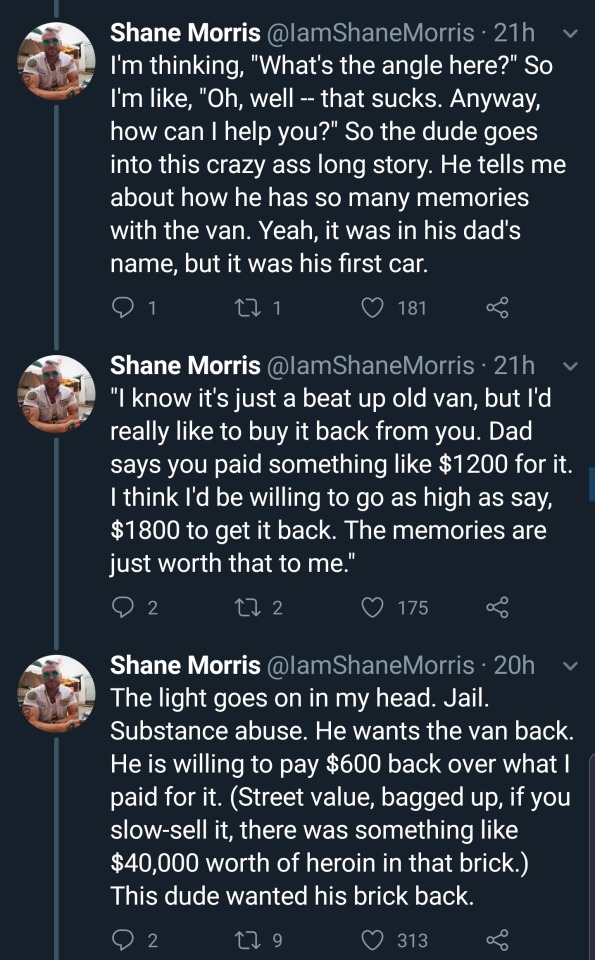
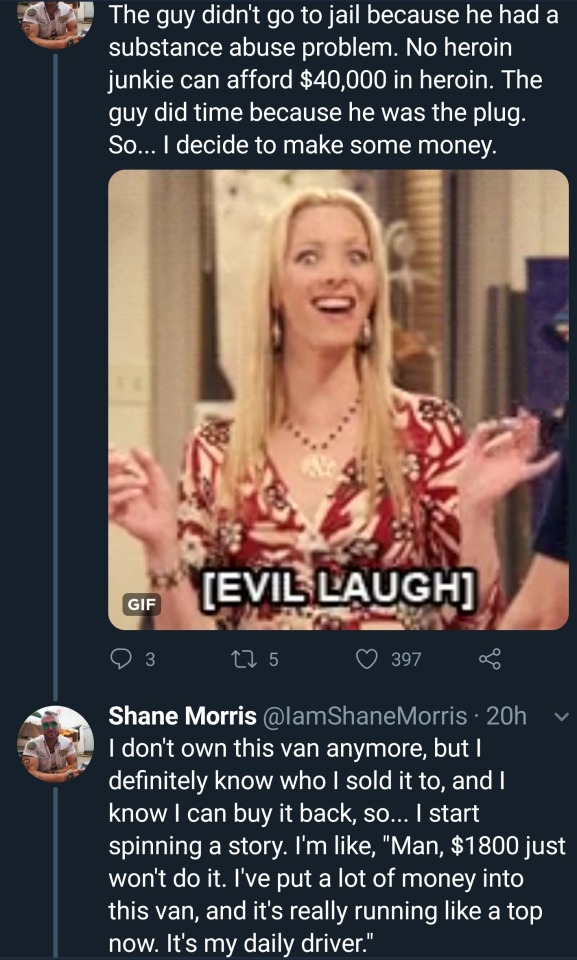
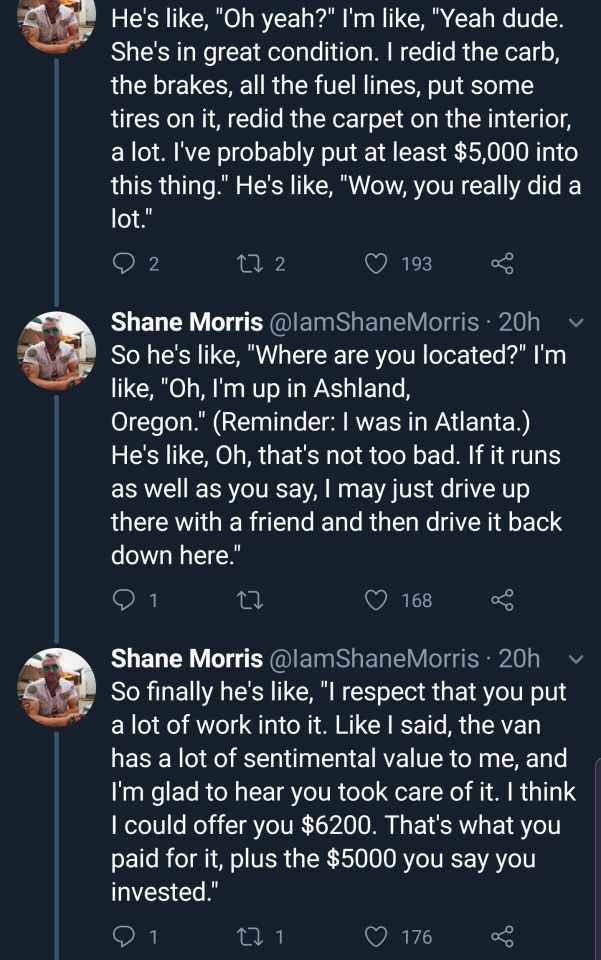
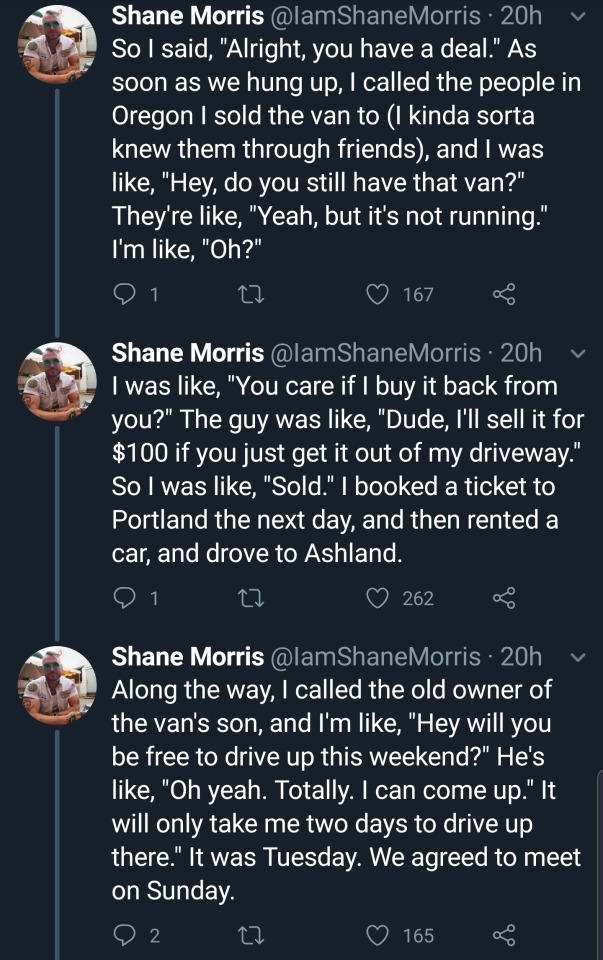
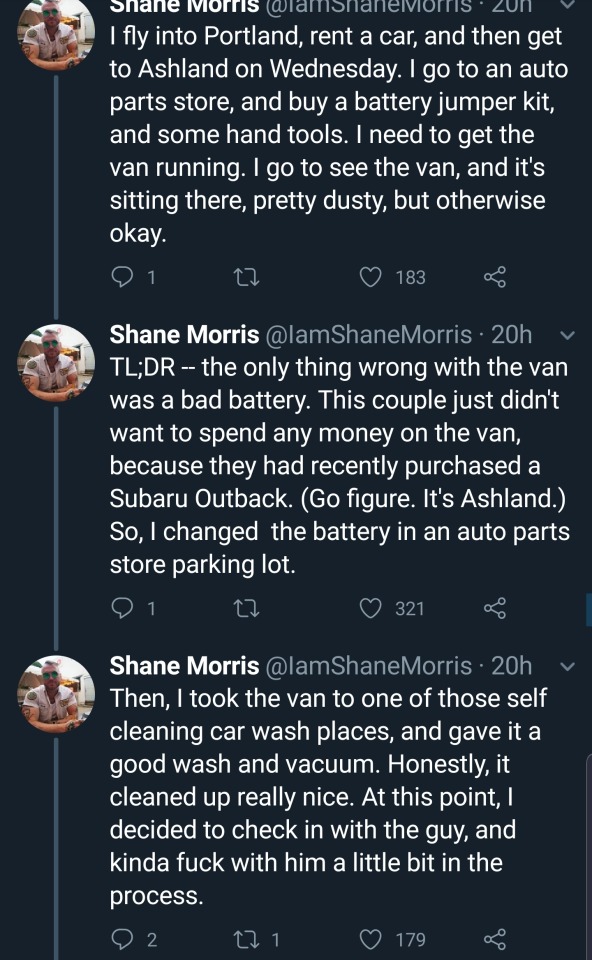
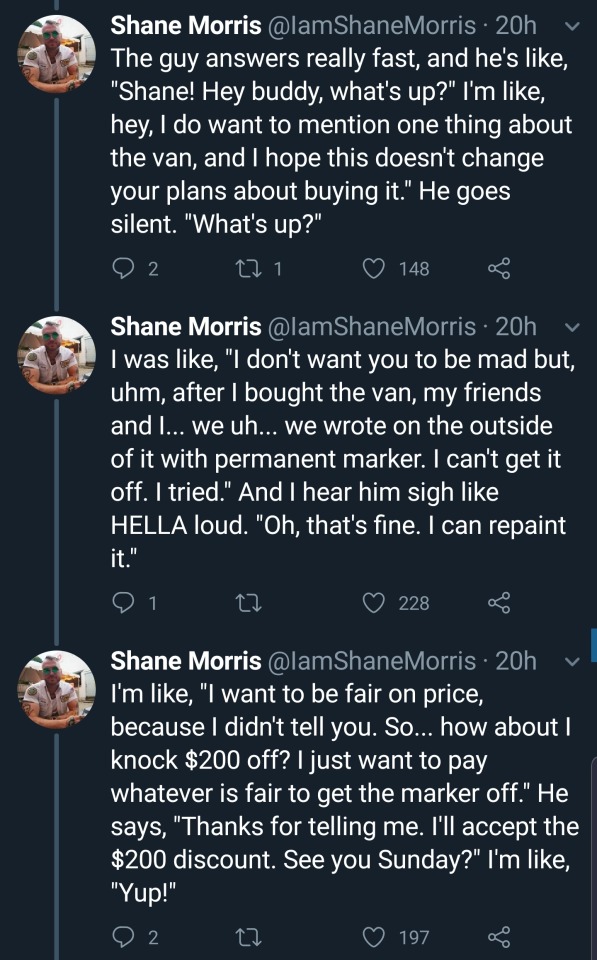
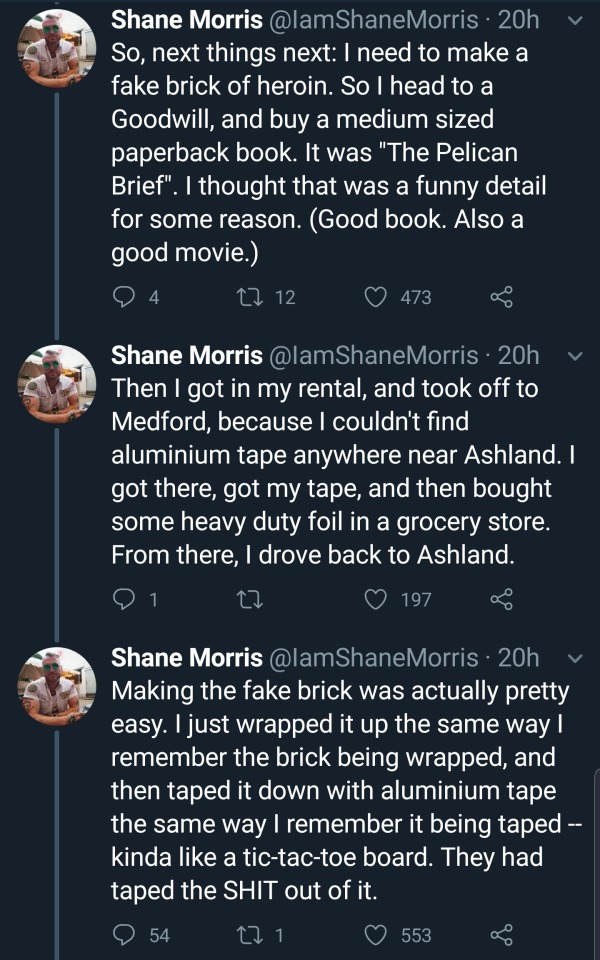
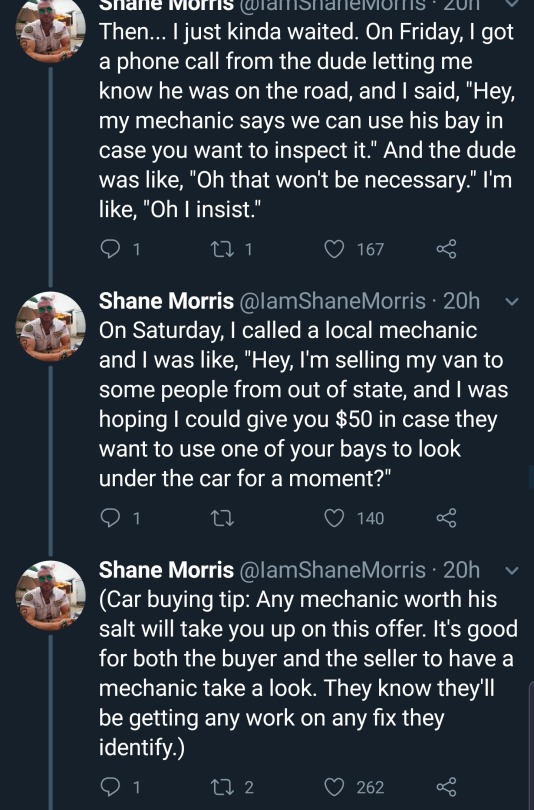
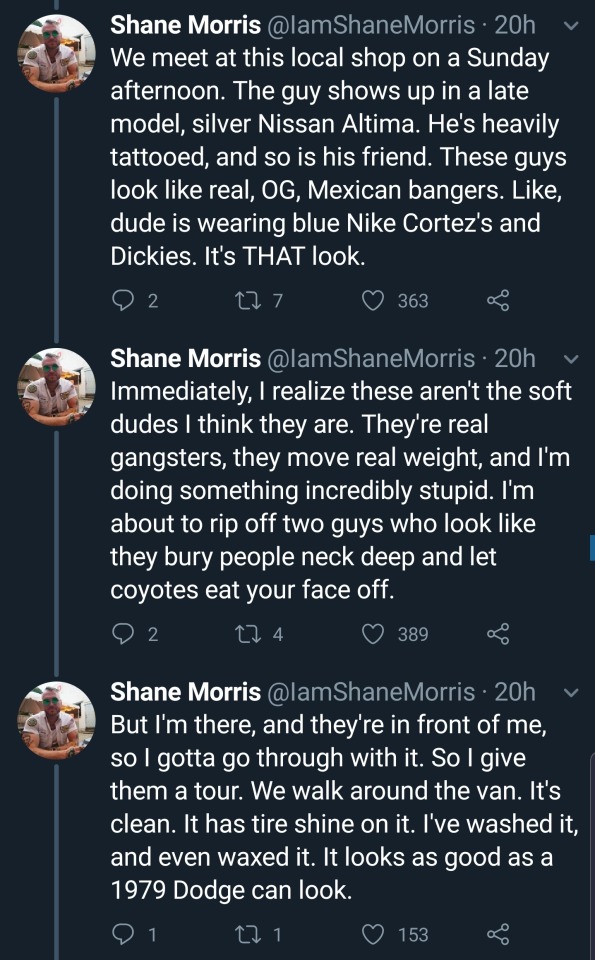
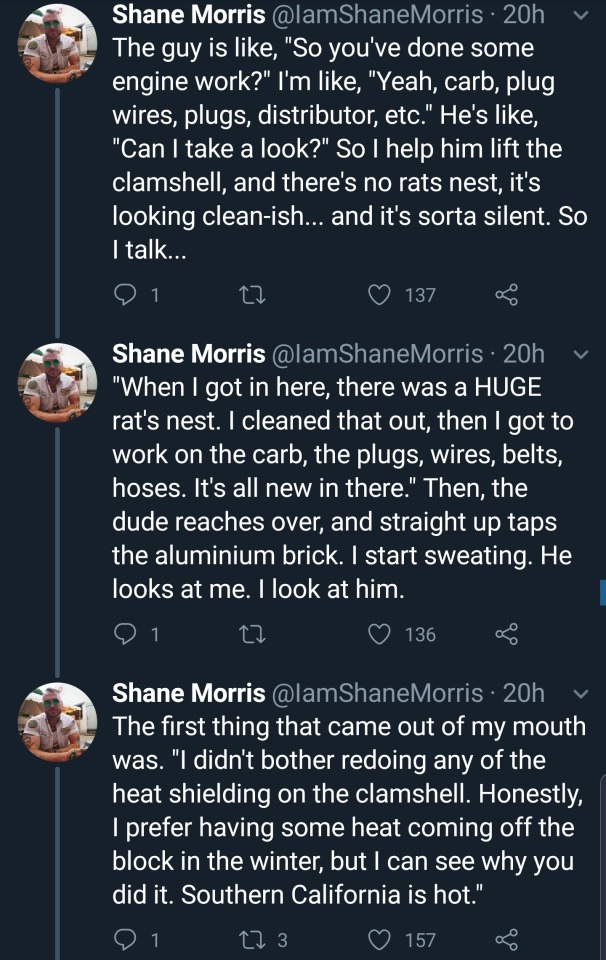
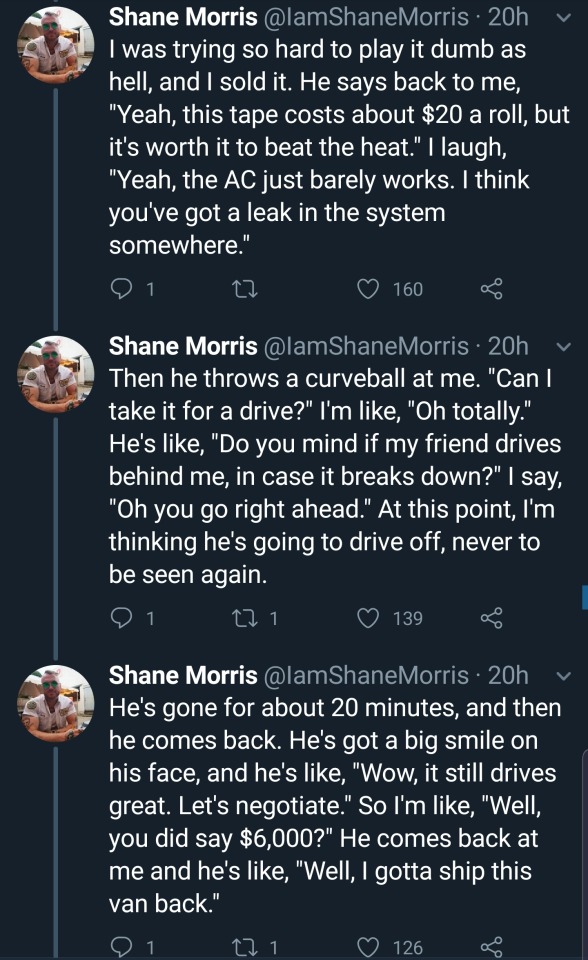
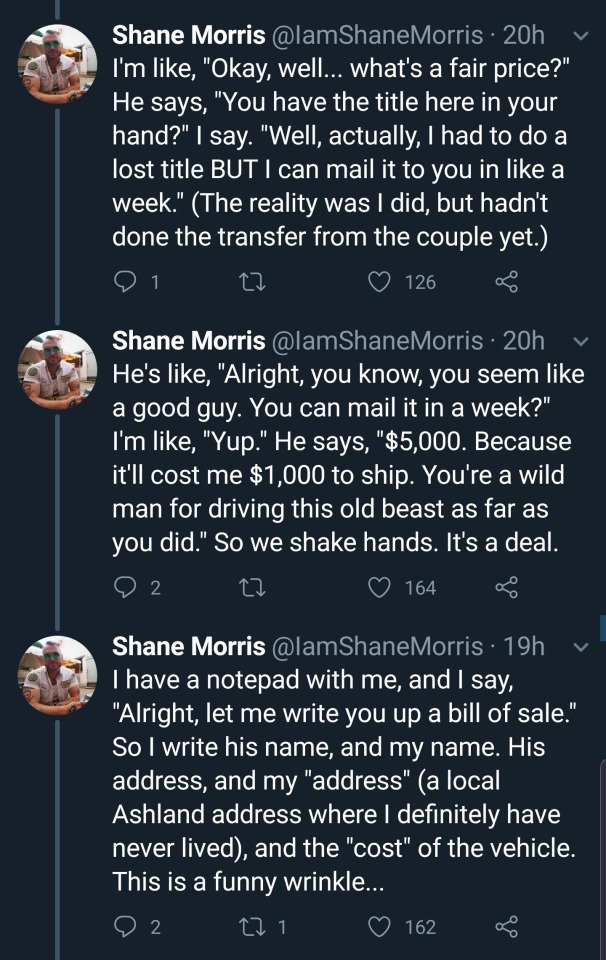
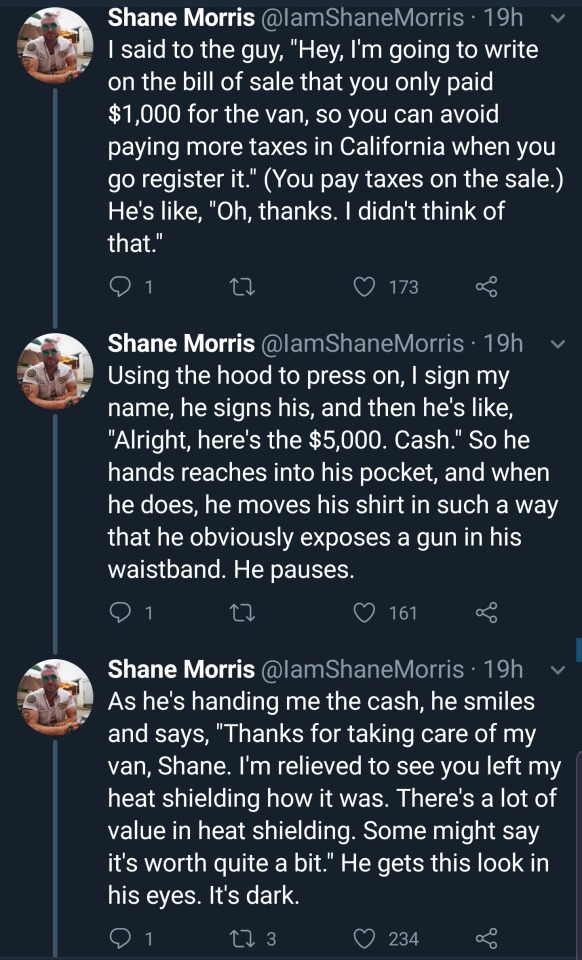
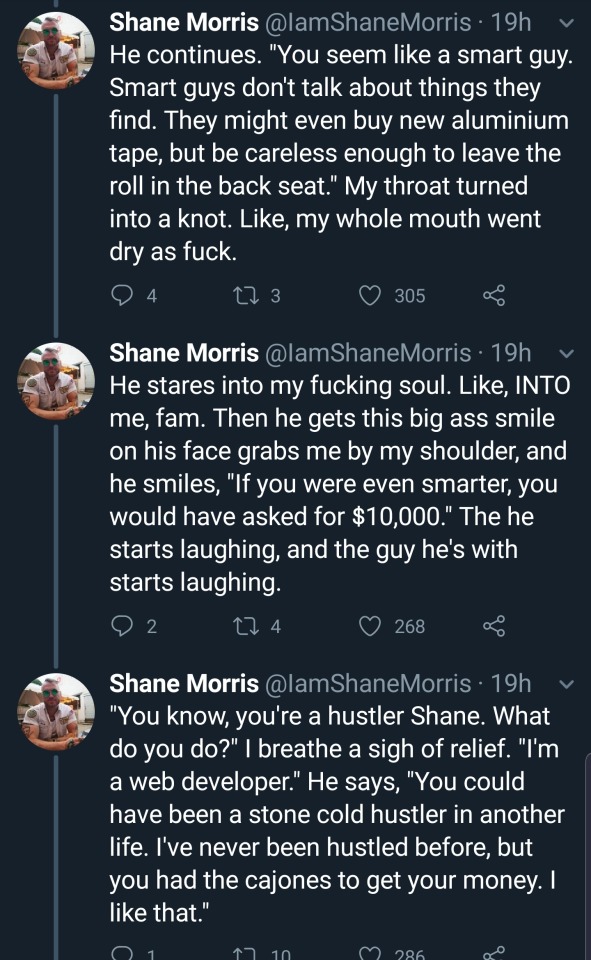
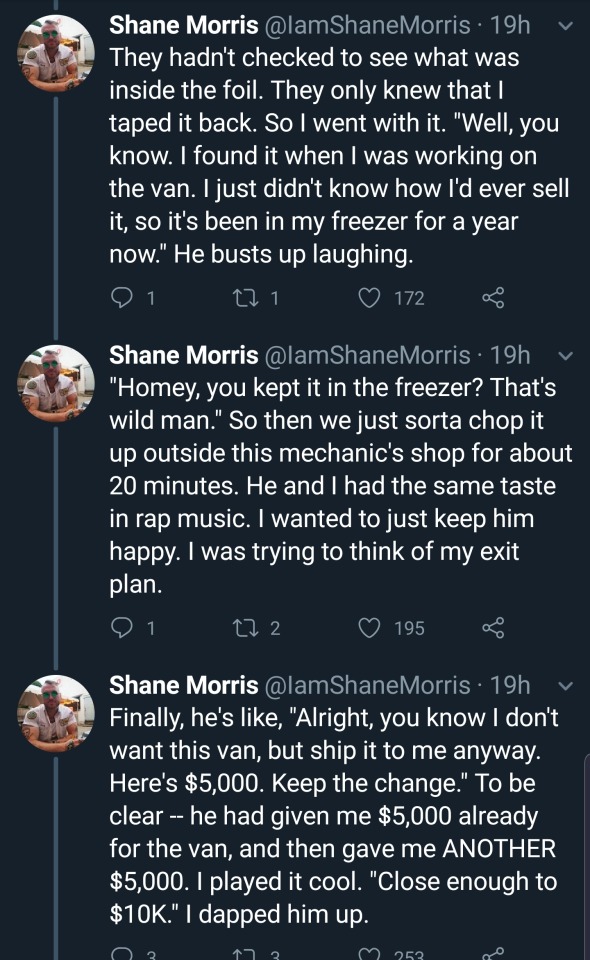
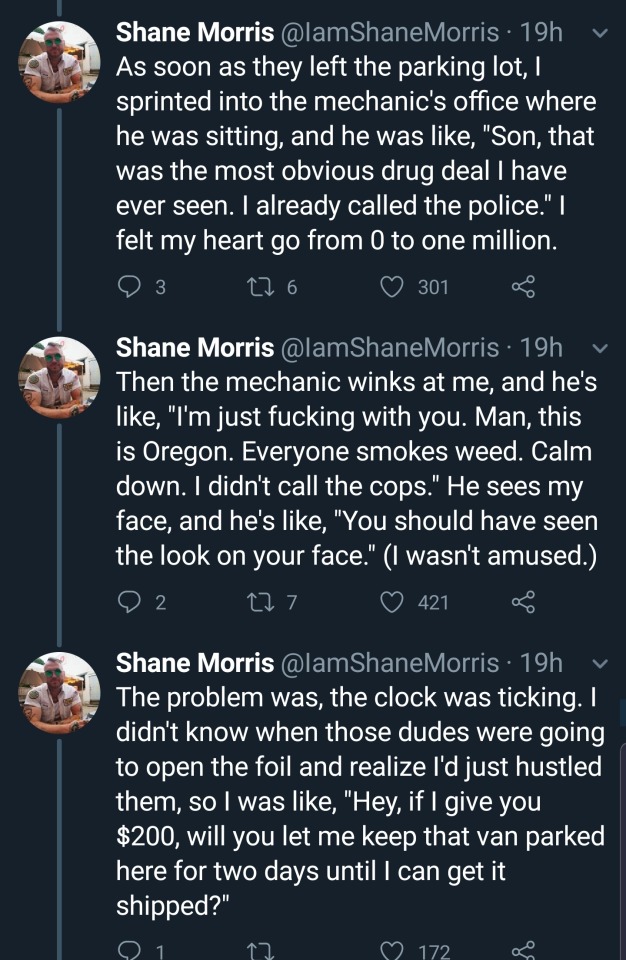
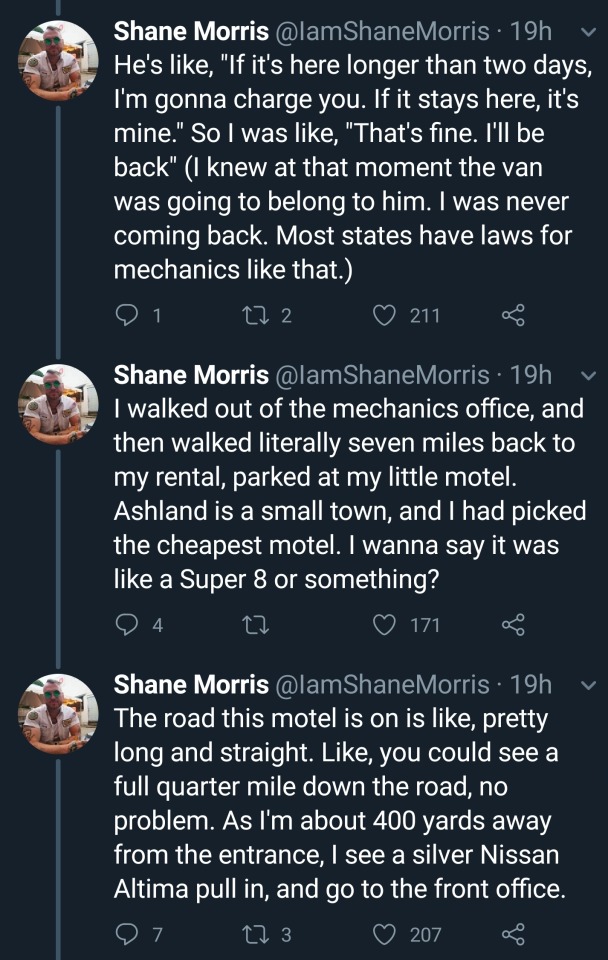
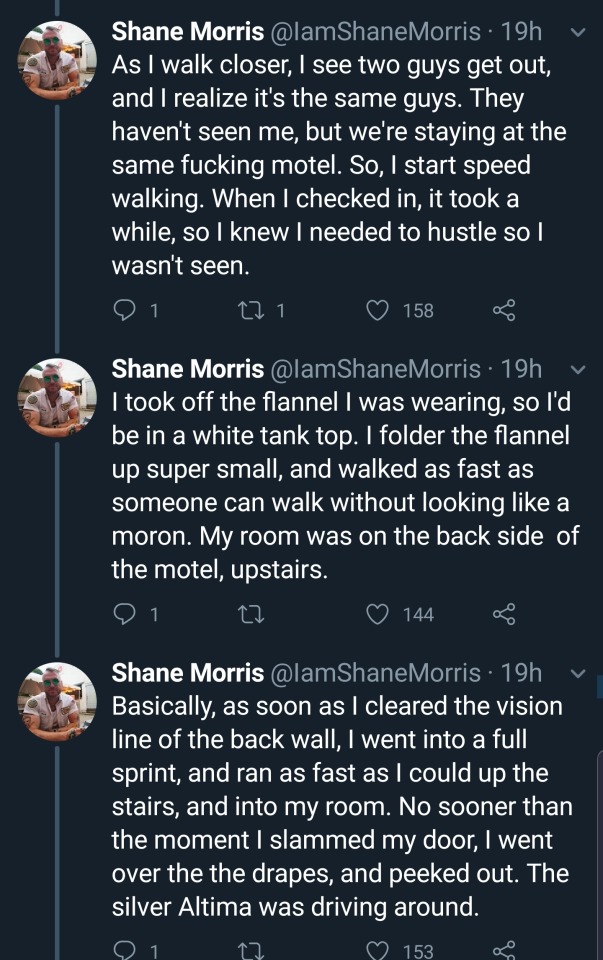
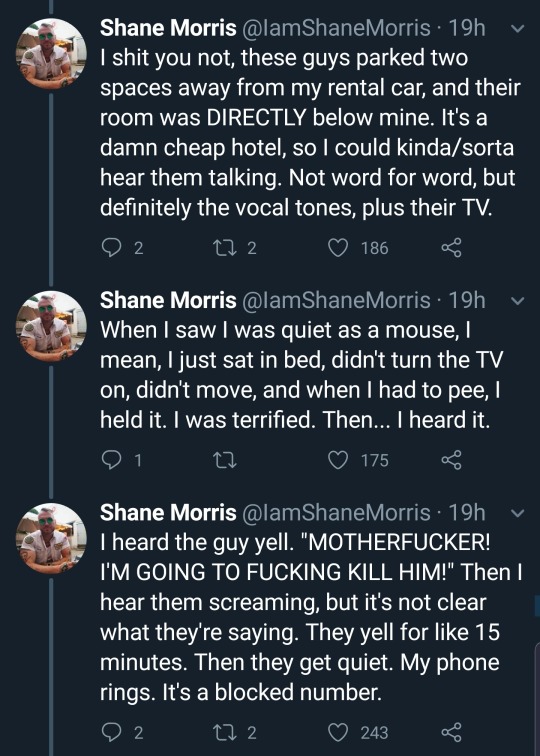
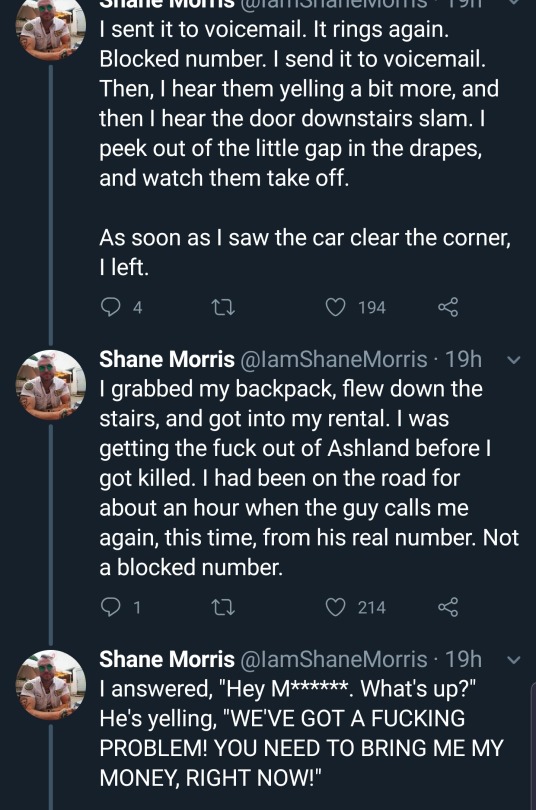
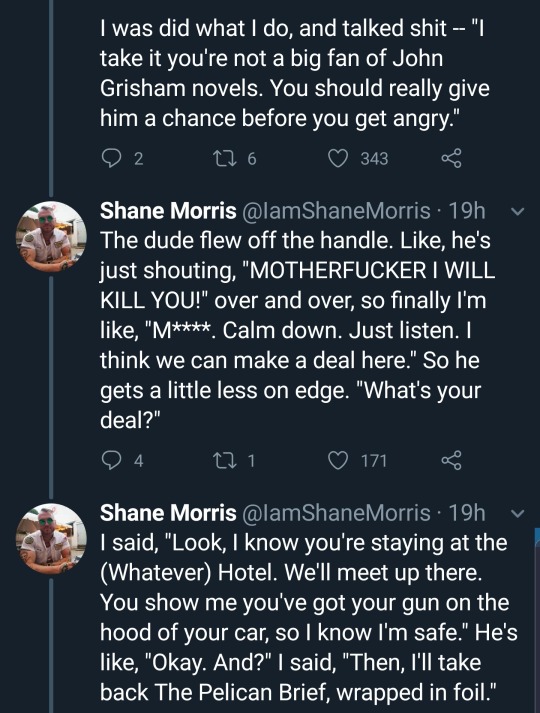
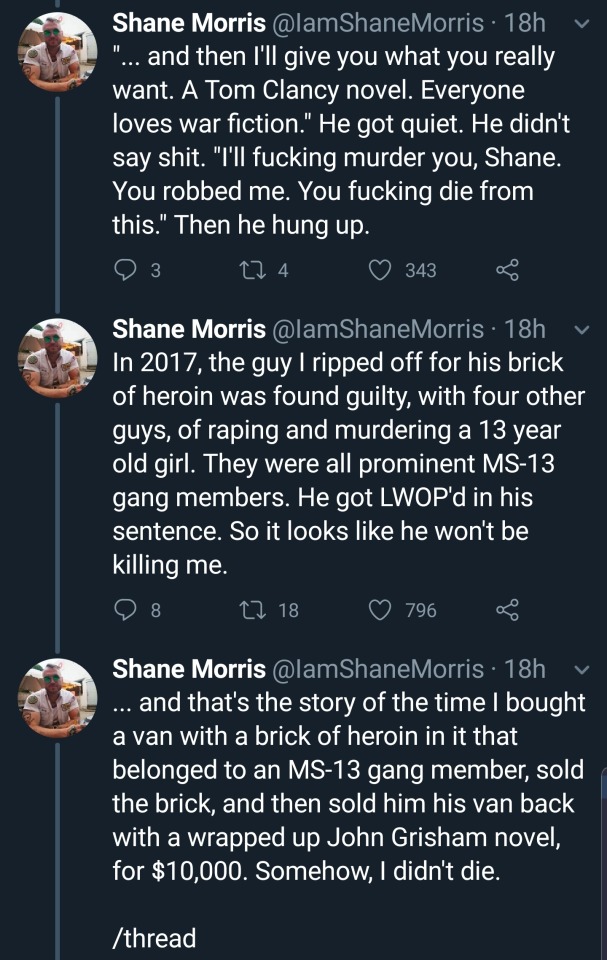
79K notes
·
View notes
Text
In the last few days, wildfires in Southern California have raged through neighborhoods and devastated families, homes, schools, medical care centers, and so much more – affecting tens of thousands from all walks of life.
A state of emergency has been issued.
If you feel compelled to help, here are some resources and ideas:
Support
Organizations such as José Andrés’ World Central Kitchen, which has been a longtime partner of The Archewell Foundation, are serving meals to both first responders and victims of the fire.
CAL FIRE and LA Fire Department Foundation and others are working closely to support firefighters who risk their lives, bravely showing up in these high-risk environments to help save homes, families, and communities in need.
Animal Wellness Foundation is continuing to house and care for animals evacuated by the fires while Compton Cowboys is providing emergency transportation services for horses.
Airbnb and 211LA have partnered to provide free, temporary housing for those who have been displaced. Baby2baby is providing essential supplies including diapers, clothing, hygiene products, and emergency kits to families in need.
All Power Books and many others are staying open for emergency use, offering supplies and water for pickup while working tirelessly to distribute essentials to those affected.
Open your home
If a friend, loved one, or pet has to evacuate and you are able to offer them a safe haven in your home, please do. And be sure to check in with any disabled or elderly neighbors to see if they need help evacuating.
Give back
Some families and people have been left with nothing. Please consider donating clothing, children’s toys & clothing, and other essentials. The American Red Cross is on the ground helping those in need.
1 note
·
View note
Text
In 1760, California's first faxing might never have happened without the help of a hard working mule. The transmission of the message, which could have been considered the precursor to modern day faxing, was part of the Spanish Empire's effort to communicate with its remote colonies.
Because the transmission needed to travel long distances over rough terrain, a pack mule was utilized to carry the message from the founding San Gabriel Mission in what is now Los Angeles to its destination, San Fernando Mission San Fernando. This delivered message helped the Empire to communicate with its colonies in the New World, allowing for greater trade and dialogue.
The mule was an essential part of this faxing, as motorized vehicles weren't yet available in the area. Without the presence of horses, or other transportation options, a mule was essential in carrying this message in a timely manner to its destination.
The mule's noble efforts will not soon be forgotten. Historians and experts agree that this mule was the backbone of the first faxing to take place in California, allowing the Spanish Empire to reach out to its colonies overseas. The mule's hard work and diligence was key to the successful transition of information and communication and will forever be remembered by Californians and others throughout the world that have continued to benefit from its historic actions.
0 notes